#when DS ends there will be a significant break after so i can work on other things
Explore tagged Tumblr posts
Text
@oveliagirlhaditright I'm putting my Missing Link thoughts in another post because it would be too long, and honestly I have SO MANY thoughts about why the basic premise of KHML was a bad idea (completely separate from my own distaste for the "Ephemer is Xehanort's ancestor" stuff that might be in it)
Because you're right to mention Pokemon Go and it really, REALLY feels to me like it's just trying to ride the hype from the mobile ARG boom that started with Pokemon Go a whole eight years ago. Because KHML as a concept doesn't even seem to be utilizing any of the unique features of an ARG that make them appealing
There's two real franchise-based mobile ARGs that I ever remember hearing about: Pokemon Go and Harry Potter: Wizards Unite*. These two projects do make sense to me, as opposed to KHML because of the way that both franchises make use of the central concept of the augmented reality feature. They're additions to reality, which both series already played around with. HP takes place in our reality, but with a "what if magic was real and just hidden" premise, so it's insanely easy to make an ARG that's just "yeah, you're one of the people in on the secret magical society that always existed in the real world." Pokemon takes place in an alternate version of our world; every location in Pokemon is based on a real-world location. So that's also a natural progression for it, and it's easy to pretend that the "reality" you see in the ARG is just the Pokemon world. Other than location names and the presence of Pokemon, the Pokemon world is practically identical to reality
That is literally the central concept of an ARG. To make the game part of reality. And that just doesn't work with KH, a game about flying through space to reach Disney worlds. Sure, some of us might have wanted to pretend to be Keyblade wielders as kids, but did we want to be wielders in our small backyards? Not even imagining that they were another location, but the yards as they were? No! We wanted to be in the Disney worlds! Or Traverse Town! The central facet of ARG gameplay doesn't mesh with the functionality of a story-based canonical title. And so what do they do to force it to work? Complicate the lore with the Astral Planes, which completely take the "reality" out of Augmented Reality aside from... a map? Like, it might have worked with Quadratum depending on how much of "our reality" that ends up being, but that's not at all what they're doing
Additionally, ARGs are not conducive to story-heavy games! You're supposed to play them while walking around town, maybe stopping for a few minutes to take a break. Or you play them on work/school breaks. You need to be able to pick them up, play a bit for 10 minutes, and put them down. The typical gameplay cycle for most ARG players does not include 20 minutes just to watch cutscenes to get the Exclusive Lore before being able to do anything, and the people who like KH for the story aren't going to want to wait all the time for their mobile game energy to recharge before they can get their cutscenes (a thing that even KHUx did away with for story chapters after some time!)
The entire decision to make KHML an ARG, to me, feels like corporate checking off a box of "style of game that got popular in recent memory" and trying to copy it rather than thinking of the gameplay as a medium in and of itself to tell a story. Nothing about the ARG concept works with what KH is at its core, and I honestly feel like they unintentionally admitted that when it was announced that you'd be able to play it without leaving home. What is the point of making it an ARG at all if you're going to remove literally the only benefit that it has as a medium, as opposed to something that could benefit the story you're trying to tell? We are a long way from the days of TWEWY making revolutionary use of the DS technology to have its gameplay tell a significant part of its story
In an ideal world, I think that KHML should have been an MMO like we thought KHx was going to be back when it was announced. They wouldn't have to mess with the lore to make it work, other players running around would help to "populate" Scala ad Caelum in a natural way, people could form "families" with their friends to further the bloodlines narrative, and MMOs can function on the drip-fed narrative style that they wanted. It doesn't even have to be a big-budget MMO like FF14, because I actually do like KH3's artstyle and KHML's simpler usage of it (it manages to be distinctive and colorful, working in hallmarks of Nomura's hand-drawn style while still being more detailed than the PS2-era). It could just be... basically what it is now, but they add in new Disney worlds every couple of months to keep the story going
And now here we are, with a game that was supposed to be out by the end of 2023 still missing (lol) and only having had two betas by the near-midpoint of 2024 because they're having developmental issues that I would personally guess have to do with the game's self-defeating nature. I find it very frustrating
*Adding in, Wizards Unite literally ran for less than three years (June 2019 - Jan 2022) before shutting down so even being tied to a big-name franchise couldn't save it. I have a strong hunch that the Covid-19 lockdowns played a huge part in killing the ARG boom so it's doubly insane to me why Square Enix thought trying to bring it back was a good idea
#liz's shenanigans#kingdom hearts#khml#kingdom hearts missing link#yes this is a negative post so feel free to not look if you want to keep your khml hype up#i figured it should be its own post though since i had someone ask me my thoughts in dms#and like man idk i want to like khml but i have so many issues with the very premise and the way that khdr introduced the bloodlines thing#that i am just not feeling it#will i probably check it out? sure. but right now i'm not excited about it#tldr; khml being a mobile arg (for playing on the go and interacting with reality) feels contradictory to kh as a lore/plot heavy#action game series set in a purely fictional setting
16 notes
·
View notes
Note
6. Not just concepts - playing by the rules
What the previous sections have gone over is mostly the more conceptual side of cars - the messages within their design, characteristics, and even existence - and how technological and cultural shifts can ripple into them. But really, if cars were just that, they'd be no different from concept cars.

I mean, they're what we described so far, right? They are statements and marketing all in one, showcasing styling, engineering and/or market directions the brand intends to go to autosalon attendees and whoever stumbles into their pictures and descriptions. But there's so much less to making a concept car - you don't have significant budget considerations, only one example needs to ever exist, and its only real requirement is to be a (usually) physical object that looks like something that would fall under the definition of "car". I mean, literally - many a concept car were literally just painted blocks of foam and clay.


When a concept car can drive like its shape would suggest it's an exception worth celebrating.


And in this case, worth mourning.

(I opened my Top Gear magazine to this double page spread in October 2013 and it is still not done hurting. Gimme a sec I'm jotting down to build a replica someday.)
Anyhow, I was saying: while there's no less to concept cars than there is to art, there is even more to real cars than that, because they are molded by what works of art often don't have (or at least don't show): a maze of limitations (the rules of the market, the rules of the road, the laws of physics, and yet more) in a relationship of mutual influence with context and goals. Just look at the Citroën DS's headlights:

Their shape was an aesthetic decision, to be sure, albeit influenced by design trends of that context (this car is from postwar France and it shows), but one that had to account for packaging the way the technology of the time was used to achieve an engineering goal (as you can see, the inner lights swivel with the wheels to illuminate the direction you're turning!) which was a consequence of the car's place in the market (a top of the class luxury car packed with innovative technologies) which itself was influenced by brand image goals (the DS became a halo car not just for Citroën, but for France as a whole). And all this had to comply with all regulations of the time (like the standardized lights all cars had to use), such that their look is also a reflection of where the car was sold, as seen in US cars that didn't feature the then-forbidden headlight swiveling and glass covers.

And this American version allows us to focus on another detail: the little holes near the perimeter of the lights for accessing the headlight aim adjustment screws remind us that the design for a part must also account for its installation, service and replacement. Someone’s gonna have to put this thing together, after all, and the harder it is the more the car will cost to make; and at some point the bulbs will need replacing, and the more complex taking the lights apart to do so will be, the more it will cost the owner in time to do or in money to have it done; ditto for if the assembly ever gets damaged or breaks on its own. Not that you can afford to have the latter happen anyway - a headlight assembly that takes no more to fail than, say, fifteen years of literally every imaginable weather condition and hundreds of thousands of miles of the worst vibrations and shunts and punts and dirt and grime you can conceive? That's joke fodder. Good luck with figuring out how your materials will look like that far into the future, by the way.

And actually, this little thing (a tab that conceals the beginning and end of the single strip of chrome that is cut to length and then folded into the shape of the headlight) reminds us of yet another detail: the piece’s look and feel must live up to the project’s standards for quality and finish, hence the chrome strip, but have costs within the means of the project’s budget, hence the chrome strip not being a molded ring which would cost more to produce. Because indeed, especially if you’re designing a mass production car, a part cannot be designed without its production process in mind, because the two impose limitations on each other and the smallest changes to one can have enormous effect on the other. One simple styling revision can double cost and complexity of production, and a change in material or production process can make the intended shape ineffective at its purpose or outright impossible to produce and thus require from a revision to a complete redesign.
Took all that into account? Great! You’ve just designed an acceptable headlight. Now repeat for every single other part.
what do you like about cars?
I think you knew, upon asking this, that I could only ever have answered with either an ironic one-liner or a dozen-part novel. And unfortunately, this is already the second line, so novel it is. So then, without any further ado than the literal half year that’s gone by since this was asked, let's go.
1. Engineering matters
At the end of last year (aka when I started writing this, yikes) my dear old iPhone 6S moved on to a new home because it simply wasn't keeping up with me anymore. (And again, I was using an iPhone 6S in 2023. If I say a phone is too slow, it's too slow.) I had plenty of criteria for the replacement: a smallish screen not overboard on resolution, ideally a physical media control button and/or vibration toggle, repairability, a FUCKING AUX JACK... Something like the Sony Xperia 10, whose only real issue is marketing so trash you've only just now learned Sony never stopped making phones.
And yet...

This fancy wallpapers-sporting foldable is a Motorola RAZR 5G, a phone whose too-big screen already broke (though at the edge due to adhesive issues) and those who dared try warn repairing it will be as hard as phone repairs get. Why the fuck did I buy this? Well, because it has something more important than the aux jack, proper sizing, and good cameras: it made me go “That’s so cool!”, and when’s the last time a phone made you say that? It's the cusp of a new technology, and whether it becomes the future of phones, a future of phones, or just a weird footnote, it is an island of interesting in a sea of boring. And sadly, even this island is rapidly sinking. The drive for new form factors has already boiled down to the same two phones and their evolution is sinking into the usual millimetric proportion tweaking, camera rearranging, touchscreen expanding, case material switching, fingerprint sensor moving, and spec improvements not even manufacturers can come up with use cases for. I mean, seriously, how does the iPhone 15 differ from a software-updated iPhone X (which is apparently not pronounced "x", so I guess the iPhone Twitter)? Nothing is new. Nothing is tackled differently. The user experience does not differ. And why should it, when iPhone users will get a new one out of habit anyway and many are so tech illiterate moving a button could hospitalize them? Five generation newer and 150% faster are numbers you basically have to trust, because they don't make a difference that matters.
But in cars? 150% faster will matter alright. Even just looking at it. Cars are a visceral experience to even witness, let alone ride in or drive, and the frantic engineering pursuits for performance and overall capability actually have impactful real world implications beyond "some pockets will bulge 1mm less". And their engineering involves so many fields that there’s always a breakthrough going on somewhere - which leads to another reason their engineering is so interesting: there’s simply so much of it that anyone interested in engineering will find something for them, no matter their level or sector of expertise! Interested in mechanics? Well, obviously you’ll have a field day! Aerodynamics? Don't even get me started! Electronics? You're getting more goods by the year! It spread from engine management to safety assists to infotainment to ergonomic adjustments to even suspension and aerodynamics! Sound design? Even just working on the way engines sound is a profession of its own, let alone making these barrels of metal and glass propelling themselves at triple digit speeds through hundreds of explosions a second things you can comfortably have a conversation in - and that's not even mentioning horns and chimes! Hi-Fi? We’ve spent most of a century trying to get concert hall sound from a tiny tin can where everyone sits off-center and everything bumps and shakes around and you have maybe room for two components* a third the normal size and speakers can only be in a handful of places you wouldn’t want them which may well be the next room over**!
And this is just engineering.
*Like everything in the car world, there are exceptions to that
**For those unfamiliar, subwoofers, the speakers dedicated to, indeed, sub-bass, due to their frequent humongousness are often installed in the trunk.



#you wanna know just how much more to production cars there is than the concept itself?#this was meant to be the section about that#and now it's just one of the THREE#ford forty-nine#jaguar f-type#mazda furai#citroën ds
105 notes
·
View notes
Text
The thing is, I know Kyle was gonna be redeemed in the last movie, like almost everybody would know that disney would choose that road. But do I like the way they executed it? No. Its no surprise, its just disappointment. Honestly we were clowns that disney would even break the mold and embrace that their story mustn't always mean redemption, but still deep down we knew it would be like that. We just hoped that it wouldn't be.
Kyle is a metaphor of neo-nazis and shares incel characteristics. There has been no valid reason to root for his redemption, and there has been no significant flashback showing how he was when he was good. We don't sympathize with him and TLJ was supposed to do that and it only made me dislike him when I was neutral with him in TFA. And his redemption fell flat after all the murderous shit he did throughout the era and well at the beginning of the movie. And then his redemption falls flat. So at this point why even redeem him at all? Just make him a full evil interesting villain, an actual reverse Vader. That would make a satifying narrative than a halfassed attempt of redemption that has been thrown away in TLJ and when jj started the movie with him murdering people.
And then people argue, Vader or sometimes Maul, they got redeemed but no one complained. Well because they are not like Kyle. Anakin suffered throughout his life from both Palp's machinations and the world around him, he was a slave and was selarated from his mother Shmi that loved him most and was unable to save her, he has a support system that keeps falling apart (Ahsoka being framed and leaving, Obi-Wan hiding shit from him and him doing the same, Padme being overcome by her feelings that her groundedness when with Ani), and Anakin is overly selfless that it becomes selfish, he is motivated by love but goes to extreme measures that is destructive for himself and the people he loves. It made it easy to see why he fell. Not condoning his actions as Vader but you get a sense of tragicness in his story. Narratively, he got redeemed in the end, but no one, not even in legends, absolved Anakin off his sins. Leia, both in canon and legends, hated Vader, her abuser, even after knowing he is her father. And once she understood why Anakin fell, she still didn't forgive him. Vader is still demonized by the galaxy, and the traumatized people under his rule are validated as well instead of being brushed off as "he's not like that anymore." Anakin might've done one last good thing in his life after decades of evil and he might become a force ghost, but his legacy of terror can never be erased and it is forever tainted, which he does indeed deserve despite how tragic it is.
Maul, was a child that has been abused from childhood to adulthood by Sidious. Stolen from his family and tortured. And then when he 'died' his master cut all ties from him. And he launches his vengeful quest against Obi-Wan. You understand that he jas tragic past too, but unlike Anakin he had no room to grow and try to become good because he was abducted and tortured for so long. He neevr chose this path, Obi-Wan even told him this. But he does have layers and limits, like how he genuinely loved his brother and mother, and regrets their loss when he tried to find Ezra as his apprentice slash brother. You can sympathize with him but you also understand that with no chance to bloom, he is malice and evil embodied. And this means his death was not redemption, he might've had a brief moment of kinship with Obi-Wan but it doesn't mean he is good now. We just feel bad about him that's it, nothing more. And Obi-Wan understands this, that he never had a chance to escape revenge and the dark side, and comforts the person who had hurt him so much in his last moments.
Now Kyle. Kyle had everything. Kyle came from a loving household and people that cared for him. Leia, Luke, and Han cared for him so much and i believe that when they felt Palps or Snoke was influencing him, they tried to stop him, only ultimstely Ben chose to follow Snoke. He had no tragic backstory or any past pain to motivate his fall, its only his quest for power and completing his grandpa's 'legacy.' Palpatine had reason to manipulate Anakin in a guise of doing good, wanting to save the people he loved, but what would he promise to kyle? power. And that's the line. Anakin fell for love, kyle fell for power. All the pain he felt, he inflicted on himself, because he wanted to be more powerful. Killing Han Solo, would make him powerful, kill Han Solo he did. How are we supposed to sympathize with this?
However this doesn't mean this is bad, in fact this makes him interesting. When done correctly it could've been intriguing. Kyle is one of the few dark siders that chose just for the sake of it, and is actually conflicted by the light. Just like how someone in a good family could subscribe to radical doctrines despite their upbringing. The problem is post TFA and the fandom tends to woobify him and his mistakes. Ben solo did do wrong, heck he might've been more wrong than the cooler previous sith lords we already have in the movies, choosing evil for no selfless reason and without a tragic history of pain. There is no reason for erasing this. Yet here we are, we're kyle's inner conflicts sre protrayed as his tragic suffering when he brought it upon himself and he gets turned into some hero character. And I feel like this is why his redemption didn't work. Anakin fell for love, returned also for love (even if it didn't repent him). Ben fell for power and suddenly he went back because he felt guilty about it? We have no clear image of the person Ben was before he fell so its hard to empathize with him or his redemption, then just might as well make him full villain or at the very least if he is to be good at the last second, don't make him romance his enemy/victim and don't treat like his old sins don't matter because.....
Excluding other media, the Vader in the original trilogy has never been shown to be explicitly killing innocent people as often. The Death Star may or may not count but it wasn't his direct doing. Kylo already killed villages of innocent people personally (because we disinclude DS so I'll disinclude Starkiller Base, even if Kyke never showed disapproval of it unlike Vader). There is a jarring conteast on how kyle is frequently shived to our faces as a "murderous dude that likes to common cultural cleansing" while Vader in the movies is more of a "cruel general to his enemies." Because of this his redemption in the movie doesn't feel flat, yet the other media show us he is truly more than that and his past sins and actions still echo through the galaxy. Kyle is murderous on screen and when he suddenly gets redeemed without any remembrance of the victims he killed, my reaction would be like "wait what how about the innocent peeps that didn't know about him that he killed at the start of the movie." Its a thread that left loose to facilitate the white boy redemption that didn't need to happen. And Rey herself treats it like an afterthought too, kissing the evil incel boy despite knowing what he has done.
Tl;dr: Kyle is a worse villain than Ani because he chose the dark side for power while ani did it for love, which would've made his character interesting if they didnt treat him like some tragic angel
#saw some people complaining that we have no common sense fro whining like we didn't expect it#yes we did we just dont like how it was executed#tros spoilers#anti reylo#anti tros#anti tlj#anti rian johnson#anti rj#tros#star wars#sw#star wars the rise of skywalker
26 notes
·
View notes
Note
An important thing I don't see acknowledged often is that Axel wasn't a very good friend to Saix during Days. They had a plan that seemed to be working, almost half the Organization was eliminated at Castle Oblivion, and Axel abandoned it in favor of eating ice cream with a pair of children. Doing so made sense from Axel's point of view, but turn off protagonist centered morality and Saix being upset is a lot more reasonable.
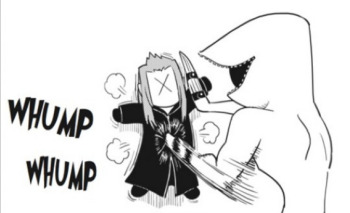
Yeah, I agree with you about protagonist centered morality. I think this is why Saïx’s character got the short end of the stick in this series. Sadly, he never had all of his mysteries revealed, and it wasn’t considered a priority to treat his character with the maturity and respect he deserved. I think once we learned more about him, we were supposed to have a whole new perspective on how he acted in 358/2 Days. That’s why I thought Isa in BBS was such a great plot twist. In so many ways, he was the polar opposite of Saïx. I was SO excited to learn more about him.
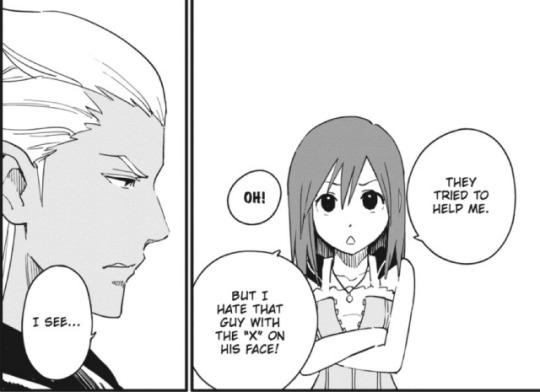
It’s sad how little respect the general fandom had for such an interesting character and for the significance of Lea and Isa’s friendship. And I think it was all due to Saïx being an antagonist in a series with very protagonist centered morality. People weren’t able to look past the superficial exterior of a “bad guy” and see what Isa’s character was all about.
I liked Roxas, Axel, and Xion’s friendship for what it was. But I have to admit, I do find it very annoying that the sea-salt trio gets put on a pedestal as this perfect group of friends (which it wasn’t) just because they were the protagonists. Meanwhile Isa was treated as an afterthought to Lea (which he wasn’t). I lost a lot of respect for this series after KH3 due to this black-and-white writing.
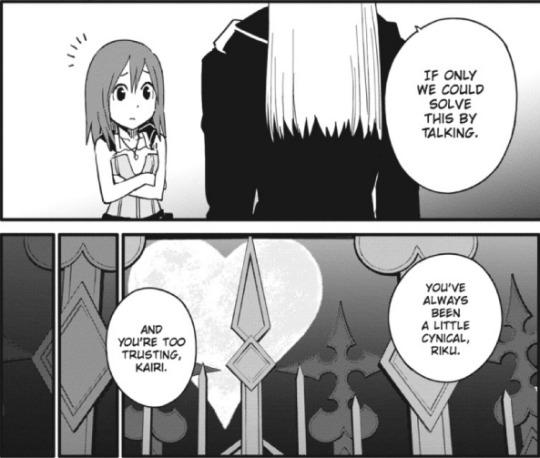
Before KH3, the impression I always got was that Axel and Saïx were prisoners of the organization. Especially Saïx. They made a plan together when they joined. They both agreed to eliminate anyone in their way so they could be free. It was Mr. Nice Guy Axel who was the one that never complained about the dirty work. And he was serious. He was gonna kill Naminé. He was fine with being an assassin for all that time. I got the impression that Isa was probably the idealistic one and Lea was the pragmatic one who did what he had to in order to survive. Isa was trusting like Kairi, and Lea was cynical like Riku.
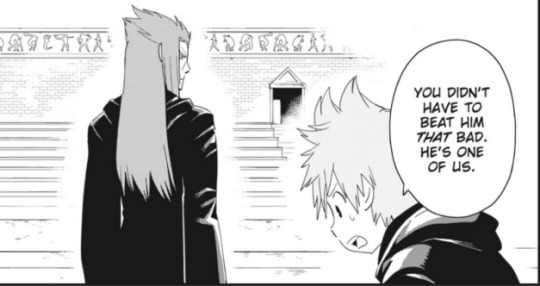
“……Don’t break him,” were the words that slipped unconsciously out of Axel’s mouth.
“Ohhh, do I detect a soft spot?”
“Sora is half one of us. He’s on our side.” But even as he said it, Axel wasn’t entirely sure what he meant. It threw him off for a moment. Was he talking about the boy they meant to turn into their tool or about Sora’s other half—his Nobody, Roxas?
“You don’t trust me?” Larxene slumped in mock disappointment. “I know when to let up. I’m not stupid enough to break my toys.”
Speaking of trust… Axel still had no idea who the traitor was.
I noticed a recurring theme in the manga. There’s the theme of excessive force being used on a comrade. This scene takes place when Saïx was checking in on Demyx’s training, to make sure he was getting stronger. He thought he was slacking off and attacked him mercilessly. Axel also had a gut reaction to Larxene using excessive force on Sora and breaking him.
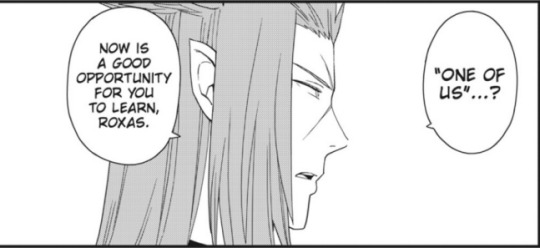
“What is it, Roxas? You have a mission to complete. You’ve spent enough time worrying about a puppet.” That word again. Roxas turned a furious glare on Saïx.
“Xion is one of us!” Saïx broke into a low chuckle, the first time Roxas had seen him so much as smile. “One of us? Don’t be absurd. Just count the chairs. When have we ever been more than thirteen?”
Saïx was very disgusted with the idea of considering other people “one of us”. It’s another reason I don’t like the idea that he was just looking for Subject X the whole time. It’s very out-of-character.
“I…I messed up a mission really bad.” Her hands were cold. “Did you hear about that guy pretending to be one of us? But I lost a fight against him. And then Saïx called me a ‘failure.’”
Saïx despises impostors. This might have contributed to his animosity towards Xion when she failed to take out Riku. Her failure reminded him of what happened to Isa. He also called her broken, which angered Axel on Day 193. I definitely think Isa had excessive force used on him by a “comrade”, and he “broke”. This scene is right before Axel arrives on the clock tower and tells Roxas why the sunset is red. I think that after Isa “broke”, that was the first lucid thing he said to Lea, which is why it was a special memory for Axel.
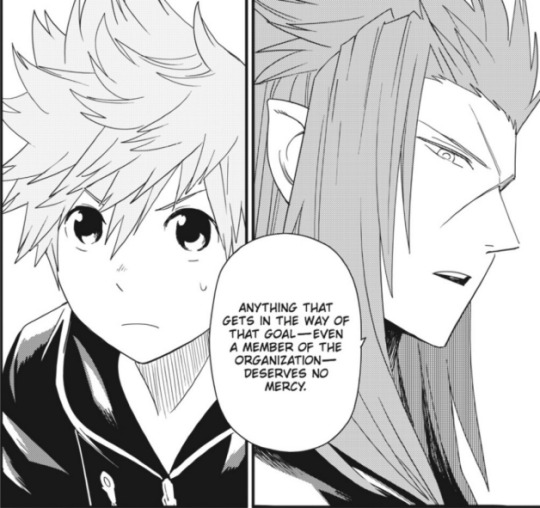
Anyone who gets in the way is shown no mercy. I think Isa was a lot like Demyx. He wasn’t that great at combat, and he was softhearted and probably naive. Lea was the realist who had to make the tough decisions.
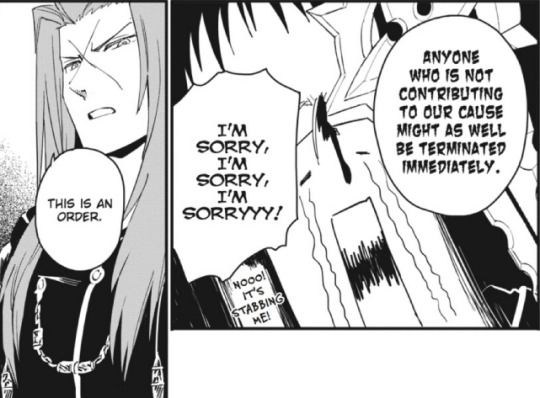
There’s a scene later in the KH2 manga that has the exact same themes. I had to conclude that these themes were significant to Isa’s backstory due to how often they came up. Saïx approaches Demyx and threatens him that those who aren’t useful will be eliminated.
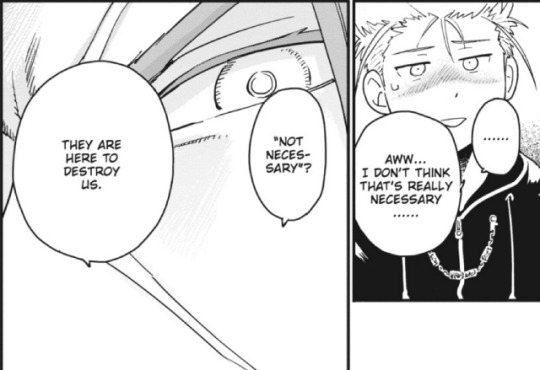
He tells Demyx that the orders are to destroy Sora. Demyx thinks destroying him is going too far.
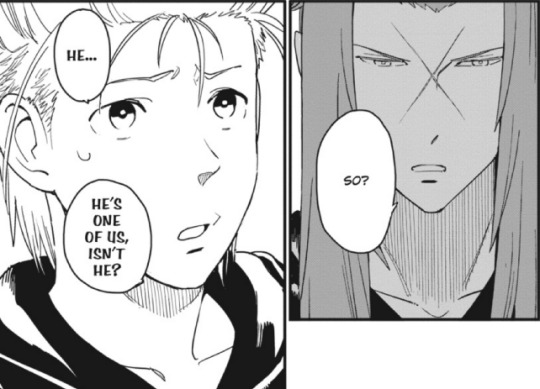
He doesn’t want to destroy Sora because Roxas is inside of him and Roxas was one of them. Saïx doesn’t care.
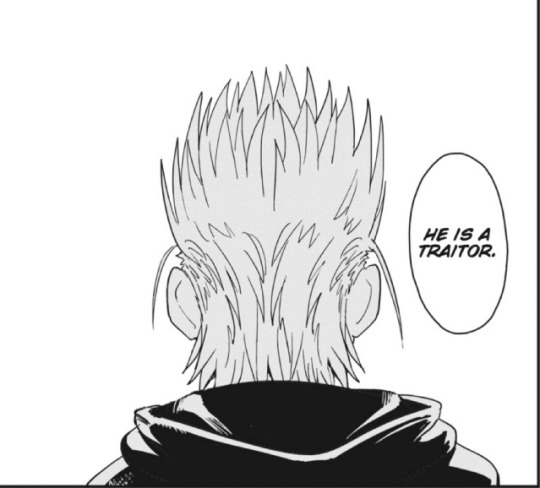
He said Sora has come to destroy them. He’s a traitor.
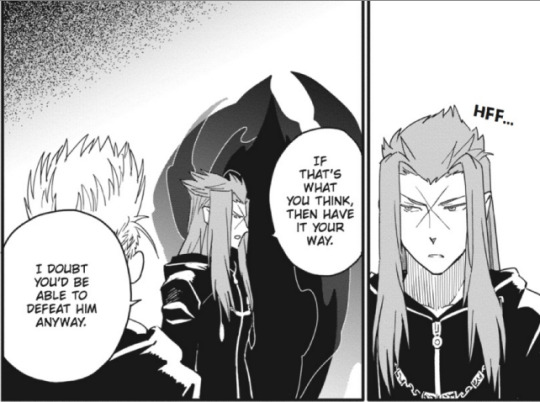
He also said Demyx wasn’t strong enough to beat Sora anyways.
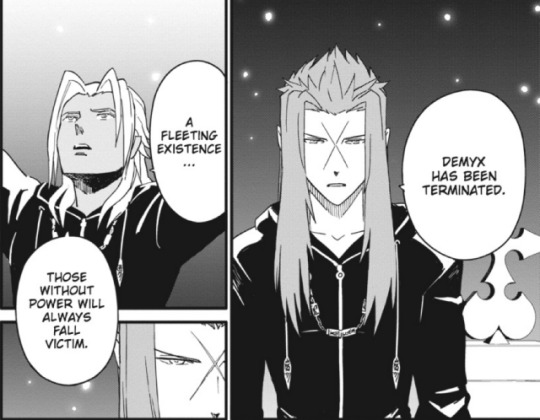
When Demyx is defeated, Saïx informs Xemnas and he makes a comment about the weak falling victim. And Saïx looks pissed when he says it.
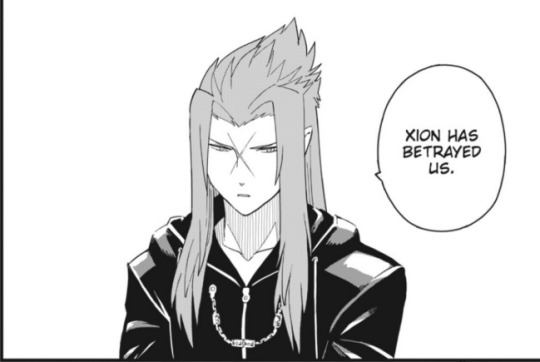
Day 298: Change of Plans
Author: Saïx
Axel failed to report that the impostor and Xion are working together. Instead, that news came from Roxas. The boy is far more easily handled than Axel, but now Axel has captured Xion and returned her to us. His motives are impossible to read. Our plans can be altered if necessary, but doing so can only delay their realization.
The same themes come up on Day 298, which is when Axel has a moral dilemma. This is a day that Saïx has a really hard time reading Axel’s motivations. Xion is declared a traitor.
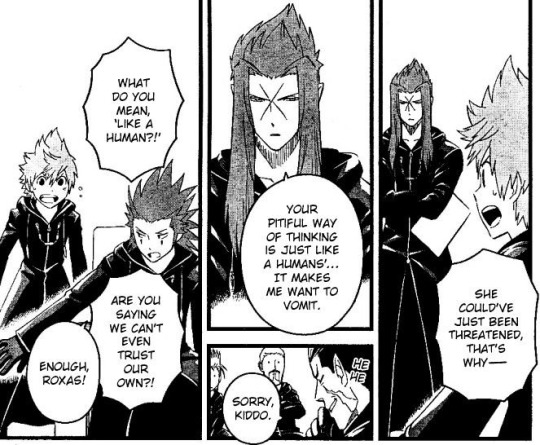
Saïx is utterly disgusted at Roxas trusting someone just because they are a comrade. He even said that was “human-like” thinking. Axel is actually on Saïx’s side.
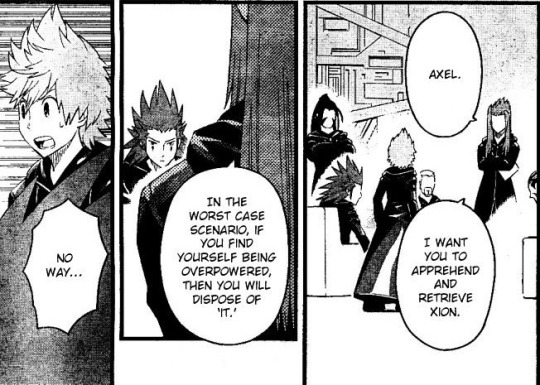
Roxas thinks destroying Xion is going waaay too far, but Saïx is merciless.
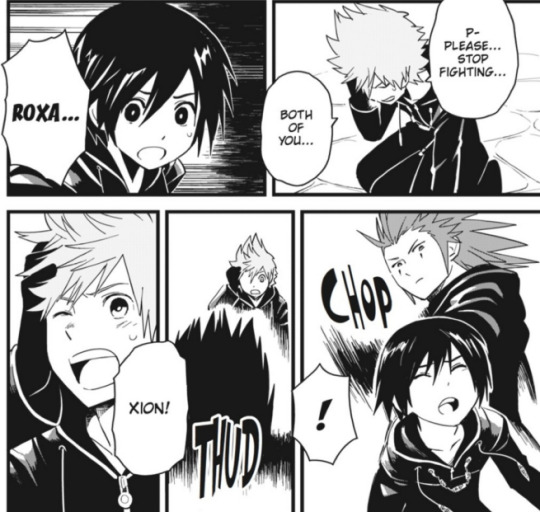
This is the day Axel decided to make a tough choice. In the novel, he said he was doing it for everyone, and specifically for Isa—not Saïx. He started to isolate himself from Roxas. The day after, Axel is feeling doubts. And Saïx said he never expected Axel to question whether something was “for the best”. This scene was one of the few animated scenes on the DS. It was obviously very important.
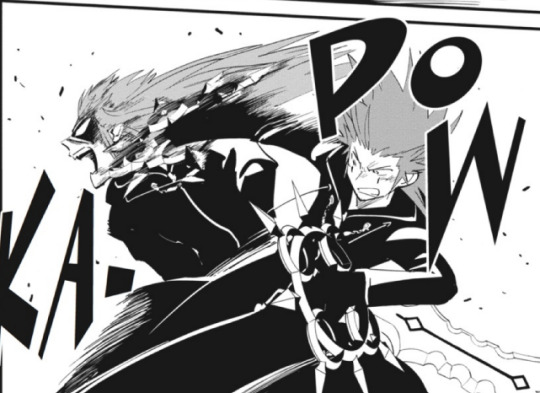
Axel took Xion down with a strike to the neck. And this is also how he defeated Saïx in the manga. I highly doubt this was a coincidence.
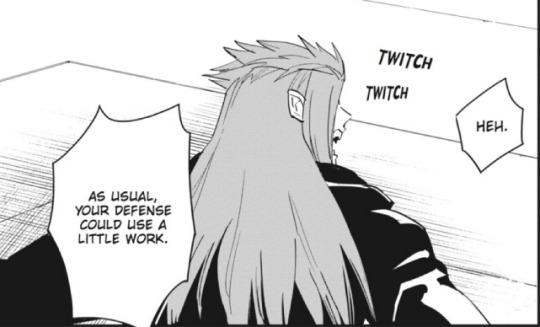
After Saïx was knocked out, Axel even made a remark that seemed like he was referencing their past.
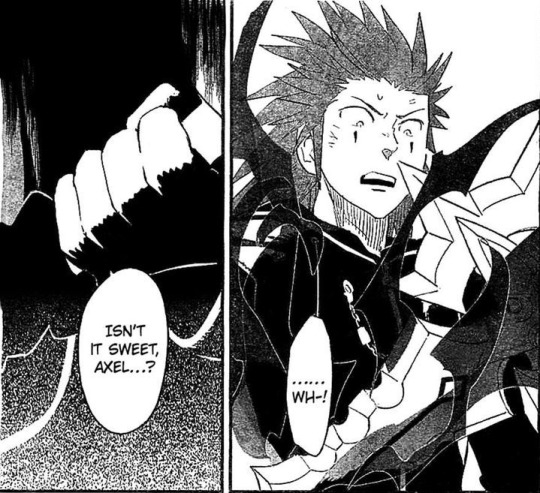
And this is why I bought all the localized mangas. Sometimes you get a better understanding from different translations.
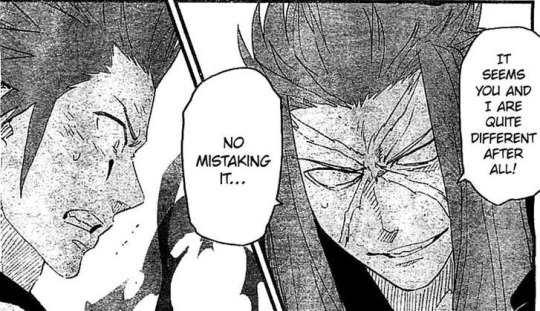
Day 356: Unforeseen Events
Author: Saïx
Our plans never accounted for the possibility of both Xion and Roxas leaving. How did this come to pass? When did Roxas grow strong enough to outmuscle me? What were you really after, Lea? We joined the Organization at the same time, and formulated our plan. At this point, it’s just an idle fantasy. Everything changed. You, and me.
Saïx wakes up again and stabs Axel. In the fan translation, he makes a remark that he and Axel really are different, after all. I wasn’t sure exactly what he was referring to, but I figured it was a reference to their past.
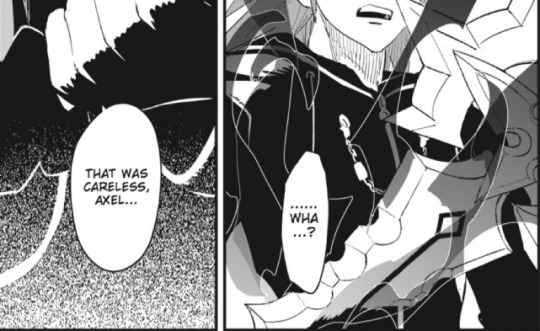
And the official localization makes me think that even more so. Saïx tells Axel that he was careless.
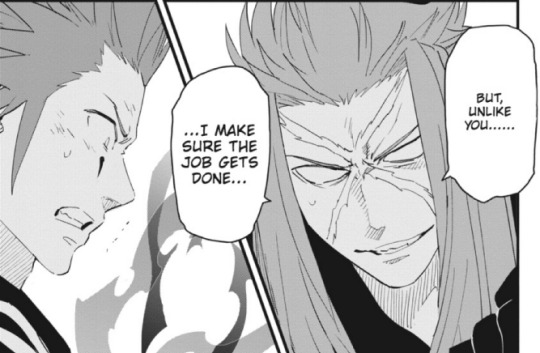
Unlike Axel, he makes sure the job gets done. I figured that was probably what he meant, but after seeing both translations, I’m more confident in that interpretation. Saïx and Axel’s roles are reversed from the past. Axel didn’t want to kill Saïx, so he took him down in a non-lethal way. Saïx used that opportunity to try and kill him. It implies that in the past, Isa was reluctant to kill someone, but Lea was more willing to get his hands dirty.
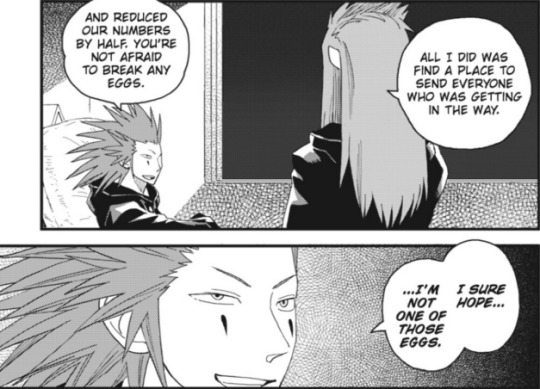
“Axel says he’s willing to harm Naminé to get to me,” Marluxia shouted. “But you won’t let that happen, will you?!”
“…Axel!” Clutching the Keyblade, Sora glared at him. Still? Axel thought. Facing Sora like this reminded him of Roxas, which made him uneasy. The memory of a feeling welled up within, something that had never come over him when he confronted Marluxia or Larxene or Vexen.
But those connections were no more than memories of the past—Axel had never cared about anyone since becoming a Nobody. What was happening? Why was Roxas so important to him? Why was Sora? So long as he understood what the stakes were, he should have no reason to recoil from terminating someone. After all, he was a Nobody with no heart. And yet…he didn’t want to do this.
It’s probably connected to the backstory of how someone like Lea gained the temperament to become an assassin. I think Isa wanted to trust one of their “comrades”, probably a fellow test subject. Lea wanted to take him out. For some reason, Lea knew the “comrade” was going to betray them. Isa wanted to find a peaceful way to resolve things.
“Does it hurt, Naminé? Watching your two childhood friends fight all because of you? You have my sympathies,” Axel said quietly. “From the heart.” His words were meant for the Replica. Not for her.
He gave the traitor the benefit of the doubt and probably stood in opposition to Lea, defending the impostor. This is probably why Axel despised Naminé so much and why he couldn’t destroy Sora. Naminé was manipulating both Sora and the Riku Replica and causing them to fight. And she was luring Sora to a horrible fate by manipulating his trusting and compassionate nature. Being so merciful came back to bite Isa. I think this is why it was always so important to Axel that Saïx trusted him. Isa had already been betrayed by someone he thought was one of them. Lea was the only one he could trust and Axel never wanted to betray that trust. When Saïx called Axel a traitor, it deeply hurt him.
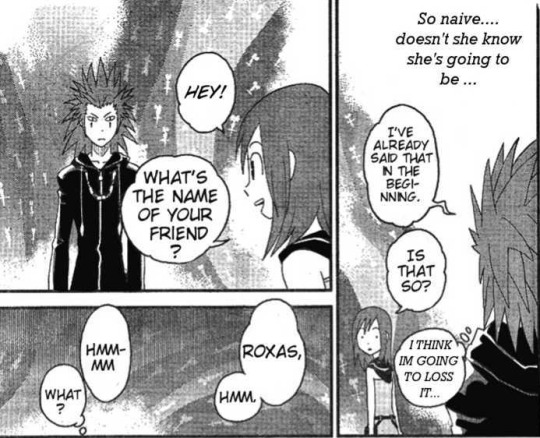
The traitor likely tried to kill Isa, and then Lea probably took them out, or at least tried to. It was what happened to Isa that made Axel and Saïx so cold and ruthless to anyone in their way, and especially traitors. Axel was always doing it all for Isa. It was because Isa was such a kind and gentle person. That was what got him into so much trouble, so Axel agreed to do all the dirty work for him. But Sora, Roxas and Xion were innocent, like Isa was. It would betray Axel’s feelings for Isa to harm any of them. Kairi was the same. She was naive and trusting, and Axel was going to use her to harm Sora.
That was why Axel was so conflicted all the time. He became the type of person he hated. Since he was a Nort, Saïx had no idea why Axel suddenly started acting so differently after Castle Oblivion. You’re right. From his point of view, their plans were going very smoothly. Their freedom was on the line. Then Axel didn’t seem to care anymore and was more concerned with eating ice cream with these two kids. He was getting jealous of Roxas and Xion, but ironically, the one Axel really missed the most was Isa.
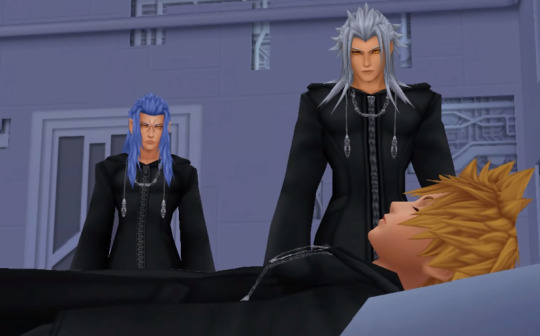
When Axel returned from Castle Oblivion, he was fine. But then Roxas told him he was worried about him. This made him not want to report in right away. He remembered a time when Isa was worried about him and it depressed him.
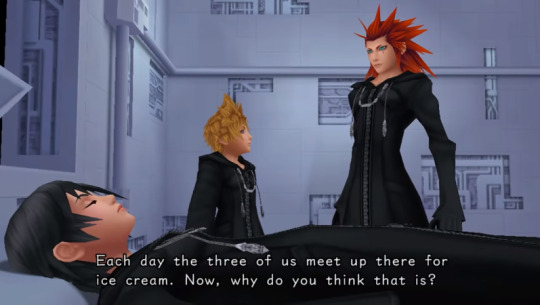
The situation with Xion was the reverse. Axel was remembering a situation where he was worried about Isa. Remembering how kind and selfless Isa used to be was enormously painful for Axel.
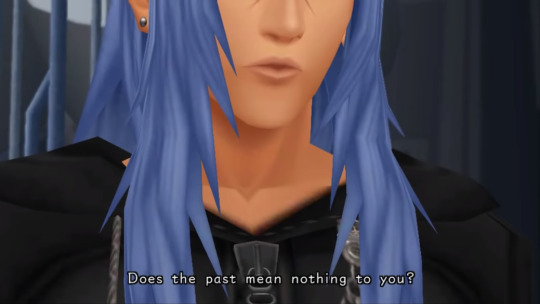
In a sense, Saïx did have a legitimate reason to be upset with Axel. All he saw was Axel growing so close to Roxas and Xion and distancing himself from him. But Axel didn’t tell Roxas and Xion they were his best friends because he had a sudden epiphany about how close they were. It was because he was remembering how great of a best friend Isa was.
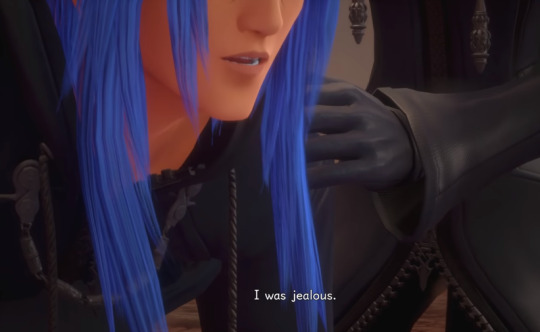
Saïx was ALSO remembering how great of a best friend Isa was. That’s why he was so upset at Axel. Isa cared about Lea more than anything and would have done absolutely anything for him. He also put other people ahead of himself. His compassion got him into trouble. It hurt Saïx that Axel no longer seemed to value what they had together. Saïx couldn’t really experience friendship, but he still had the memories of it. And he was tormented by them.
18 notes
·
View notes
Text
5: distanced
The next step is to find an in, and then an out.
The morning news briefing on TV:
Kelly Sanchez, lead anchorwoman, stares gravely into the camera. It will be another day of news that no one wants to hear.
“Good morning, Chicago. We’re here with your daily update of the coronavirus. Schools across the country have been canceled due to a significant shortage of public funding. These are funds that are currently being allocated to bail out the tanking airline industry. The President says that allowing the top corporations to suffer will result in a greater hole for the economy. We hope he’s right.
Meanwhile, bars, restaurants and shopping centers that have been re-opened early to boost the economy have not seen the dramatic rise in business that was expected. Perhaps people are too afraid to go out to dinner amongst the public, or perhaps they simply can’t afford it due to a loss of work. One thing we do know is that the most detrimental effect of these early openings is causing a further spread. As people in certain states that have not seriously social-distanced begin to cross state lines…”
Emma’s mom and dad are sitting on the couch, waiting for Kelly to tell them that things are going to get at least slightly better. But she doesn’t. It’s getting impossible to convince themselves that this will all be over soon--that everything will return to normal. It’s becoming likely that the new “normal,” if it ever comes, will be something that no one has ever seen.
*buzzzz*
Emma’s alarm wakes her up at 8:30 AM. She facepalms herself upon remembering that school doesn’t exist anymore and therefore alarms are canceled. Dammit.
But then, she remembers that Universe is currently downloading to her external hard drive. The excitement of this sends a shock through her system and wakes up every cell in her body. It’s that “Christmas morning” excitement, which is marginally more enjoyable than that “about to run away with a possibly bad dude” excitement. That kind is good too, just, different. She runs over to her computer.
16 HOURS REMAINING
Shit. The size of this application is no joke. Seemingly she’ll have to wait until tonight to begin her exploration. To find Mason.
Emma remembers the talk they had last night, and reflects on his support of her relationships with her friends. She realizes that she didn’t know many people with that quality, guys especially...it seems like they always demand her full attention and become frustrated if asked to share. Especially one guy. Well anyway, Mason. Intriguing.
Emma heads downstairs to make herself a bowl of cereal. Oh wait, there’s no milk. And no cereal either? These days, groceries are scarce and pickings are slim. Ah well, might have to be plain oatmeal. Serious orphanage vibes--which is somewhat fitting since her parents wish they could leave her at one.
Ugh. Every time you eat oatmeal, you forget how horrible oatmeal is. Isabel sits across the table from her, scrolling through her phone with intent and drinking black coffee. Emma smirks.
“Aren’t you kinda young to be drinking coffee? Plus what do you have to energize for, your job at the office?”
Isabel pays no attention to her.
“Hello? Okay what is up with you.”
Isabel looks up from her phone, a faraway look in her eyes.
“Do you have a headset?” she asks.
“Um, what do you mean? Like headphones? What are you talking about?”
Isabel looks down again.
“No, like a viewing headset. Like an Oculus or a Vive. Aren’t you like, a tech nerd? You don’t do anything with VR?”
Odd request. Emma isn’t much of a gamer anymore, she used to play Dota and Warcraft, but that was before she decided to cut back to become more social. Spend time with her friends. Date an asshole. Whatever. But in all her experience with gaming, she had never gotten into VR. She never saw the point...either play games or experience the real world. What was the point in trying to achieve both at the same time?
“No I don’t. And you know those are expensive as hell, right?”
Isabel looks nervous.
“I know. Which is why...um, I was wondering, can I borrow some money?”
Emma bursts out laughing.
“No Iz, you can’t borrow 800 dollars to buy a VR headset. Hey are you aware that we’re going through a global pandemic and the world may or may not be ending? I think food and toilet paper are better investments than virtual tennis, or whatever.”
Isabel just shakes her head. What is with this girl? She’s normally the queen of smartassery--loves to spar with Emma and argue about literally everything. She’s usually so ready for a fight, but now she feels surrendered. It’s weird how you can be trapped in such close quarters with a person and still feel like they’re on a different planet.
Emma and Isabel are two years apart. Up until Emma was 6 and Isabel was 4, they were best friends. They shared everything. Isabel didn’t want to play with a toy unless Emma played with it with her. She wouldn’t wear clothing unless it was Emma’s hand-me-down. They shared a bedroom, the walls covered with monarch butterflies. Their mom went for a theme, tacky lamp shades and all, lord knows she tried her best. Often, they would stay awake late into the night, vividly describing the dream that the other sister would have. They thought if they focused hard enough, they could carry those dreams with them into sleep.
But as they got older, things changed. The tacky butterflies were no longer endearing. Emma moved into a room that was being used as her dad’s office. She got a Nintendo DS for Christmas. And she started locking her door.
Isabel was left to wonder where her role model went. But after Emma made it clear that her hobbies were no longer to be shared, Isabel hardened herself to the rejection. She promised herself to become her own person in any way that she could, to never be dependent on Emma to define her personality.
In fifth grade, Isabel met Anush. They met because they were both teacher helpers in art class, and it was their responsibility to help set up the room before class and clean it up afterwards. They were both very outgoing, emotional, and honest. Isabel always told Anush exactly what she was thinking, and vice versa. The two girls were popular among their classmates, but the good kind of popular. They were kind, and they included the other girls who wanted to be like them.
So really, it makes no sense that Isabel is being the way that she is. She’s confident, vocal, and annoyingly optimistic. On a normal day. So what’s wrong?
“Emma, someone just dropped a package off for you.”
Their mom called from the other room. Isabel leaves the table, stressed and defeated. Emma continues to chip away at the bowl of grey sludge in front of her. It’s crazy that there are still people out there delivering the mail--how long until that stops too?
*buzz*
Good morning, group chat.
OLIVIA: GG morning check-in: I want to talk about what the hell Serena sees in Dan
MADISON: or what dan sees in serena?? Come on he’s like an intellectual and she’s a superficial barbie princess
ZOE: Mad you know that is MISOGYNISTIC and that you’re letting the fact that she wears expensive dresses and has blonde hair cloud your judgement!!
MADISON: oh shut up it’s early
OLIVIA: Remember when you were begging not to watch the show??
MADISON: quarantine does weird shit to people ok
Emma enters the chat.
EMMA: Ok but without Serena, don’t you think Blair is so much more lame? Like it’s the best friend combo that makes the show imo
ZOE: There she is!!!
MADISON: goooood morning to our very own barbie princess!
OLIVIA: Why are any of us even awake? SCHOOL’S OVERRR. Should we like, do something?
EMMA: Like what? Sit on our asses and text each other from afar?
MADISON: sounds chill
Emma laughs to herself. Damn. She’s going to miss them.
Maybe there’s a way for her to tell...part of the truth? Leave the part about Julian out? Kind of a big part... Say she’s coming back? Make up a concrete opportunity? There has to be some sort of acceptable explanation...there just has to be. And even if she can’t come up with one...there are other things she wants to tell them about. Another boy.
EMMA: Hey do you guys wanna do a zoom chat in a few min? Just kinda feel like talking more than texting rn
MADISON: do u mind if i go back to bed and pass on that? I love u girl but i’m tired af
ZOE: aaand same here, but it’s only because i’m supposed to do this thing…
OLIVIA: so call Gabriel?
ZOE: Wellllll...I don’t wanna lie to y’all.
Ha. Emma knows the feeling.
EMMA: you out too Liv?
OLIVIA: I am innnnn give me a call when you’re ready
MADISON: kiss kiss kiss
ZOE: kiiiiissssss
EMMA: bye losers
Well, maybe telling one person is a good place to start. Liv is super understanding...she’ll be able to think of a good way to break the news to Mad and Zoe. Emma runs up to her room and closes the door. She flops down on her unmade bed, and facetimes Olivia.
“Hey Liv”
“Emmmm”
Lingering silence. Emma just kind of stares at the wall. Olivia breaks the silence.
“Sooo what did you wanna talk about?”
Emma doesn’t know if she can do it. Ok, form words. Try.
“I wanna tell you something, that’s kind of a long story. And it’s connected to other stories. And basically I’ve just gone too long without talking about any of it and now there’s like this big clusterfuck of details that I need you to know but can’t figure out where to start.”
Whew. Even the vaguest of outbursts feels cathartic. Olivia doesn’t seem to be freaked out yet.
“Emma, I’m pretty sure I know you better than anyone. And you can trust me.”
“I know you say that now but...I don’t know if, after I say what I, well I don’t know if you’re gonna trust me. I haven’t said everything that I need to say to you. Or Zo and Mad.”
“Ok, so, here’s your chance. I’m listening.”
Emma takes a deep breath. Where to start?
*knock knock*
The knocks are soft. Unlike her mom’s, whose are very prison guard-esque, and actually who is more likely to not knock at all. Emma calls out.
“What.”
Isabel’s voice comes from the other side of the door.
“I gotta tell you something.” Her voice is uncharacteristically soft.
“I’m on the phone with Liv right now, can it wait?”
Silence.
“Iz?”
Emma hears the creaking of Isabel’s footsteps down the wooden hallway, and then her beddoor shutting. Click, it locks.
Emma turns back to the phone.
“That was Iz, she’s been acting like a freak.”
“What’s going on with her?”
“No idea. I feel like 14 is a weird age, plus like, she’s REALLY social and into school and shit. This quarantine is probably forcing an inversion of her personality.”
Olivia nods with sympathy. “God, that’s rough.”
“Yeah...I feel kinda bad I guess. We just don’t really have anything to talk about.”
“Oh come on, you’re sisters. Talk about how controlling your mom is.”
Emma laughs. She flips onto her back and stretches her legs against the wall. Oh, physical exertion of any kind feels so unnatural.
“Well Liv...we do have one thing in common. Which is...one of the things I haven’t told you.”
Emma fights a smile.
“TELL ME”
“So I saw Isabel playing this weird computer game, I mean I don’t even know if it was a game or like what the hell it was, but now, I’m downloading it…”
“Uh, ok?? Why?”
“This is going to sound insane, but hear me out…”
“Hearing…”
“I got this...message...online. From someone who I’ve never met. A guy, I think, and his name is Mason.”
“OOOMG”
“Hahah well it’s not like that, I mean I have no fucking idea WHAT it’s like, because it’s very weird, and um, he’s the reason I’m downloading this game. The one that Iz is playing. Cuz he told me to.”
Silence.
“That...is really fucking weird.”
“I know.”
“You don’t even know how badly I wish I was coming over right now to go all detective on his ass right now with you…”
Emma laughs. “I know you would be. It’s so weird being here alone.”
“You’re not alone Em!!! I’m here. I know it doesn’t feel like it, but I’ll ALWAYS be here for you. That’s corny as hell but hey it’s true.”
“Hah, yeah...same. I’m here.”
How can Emma keep this incredibly annoying feeling of guilt suppressed? It’s kind of ruining the buzz of anything else. But it will be ok. Olivia will understand...
*ping*
Emma has come to expect that any message received to her ghostwriter account will be from Mason. She jumps up from her bed, still on the call with Olivia. Emma starts to get excited.
“So this is crazy but he just messaged me, ahhhhhh…”
“Eeee tell me what he said!!”
Sure enough, the message is from Mason.
MASON: hi! did you get it yet?
Emma reads the message aloud to Olivia, who is equally confused.
“What is he talking about?
“I have no idea…”
Emma starts typing a response.
EMMA: Good morning! Get what..?
MASON: a package!
Emma looks confused. Was it...Mason who sent the package? What the hell? How does he know where she lives?? Well at this point she’s not surprised.
“Liv, I gotta call you back!”
“Ok you BETTER tell me what the hell this package situation is because congratulations this is now the most interesting thing happening in my life!!!”
Emma ends the call and runs downstairs. Her parents haven’t moved from the couch, still watching coverage of the virus’s destruction on TV.
“Hey Mom where’s that package??”
“Iz said she’d bring it up to you.”
“What? Can you not give her my mail?”
Emma’s mom turns to face her. “Attitude. Chill.”
Emma rolls her eyes and runs upstairs. She knocks on Isabel’s door. Well, bangs, really.
“Hi ready to talk now. What’s up??”
No response. As Emma presses her ear against the door, she can’t hear anything. She jiggles the handle, it won’t open.
“This is really weird. Hello.”
“Hellooooo.”
“Fine, we don’t have to talk. But I need my package. Now.”
……
Emma grabs the little key from behind the thermostat in the hallway. Isabel will just have to forgive her for this. Emma inserts the key into the lock and…
The lock clicks, the handle turns, and the door opens.
Emma enters the room, ready for Isabel to yell at her.
“Iz??”
First Emma sees the packaging. The medium-sized cardboard box on the ground, the bubble wrap, the plastic…it had clearly been torn off in a hurry...
Isabel is sitting at her computer, her back turned toward Emma.
“Isabel?!”
Emma runs over and jerks the swivel chair to face her, and Isabel slouches over. She’s wearing a virtual reality headset.
The one that was sent to Emma in that package.
“ISABEL”
Isabel’s ears are covered with oversized headphones, but even without them, she wouldn’t be able to hear Emma anyway. Her body is limp. Non-responsive.
Emma starts panicking and checks Isabel’s pulse--steady. Her breathing, normal. What is happening here? What is going on??
Then Emma sees the computer screen.
The map. That fucking map.
She turns back to Isabel. She thinks of Mason. She realizes.
The right question is not “What”, but “Where.”
#writers#writers on tumblr#write#short fiction#shortstory#writing#pandemic#coronavirus#young adult#ya novels
1 note
·
View note
Text
BnHA Chapter 199: One Whole Bird
Previously on BnHA: Aizawa’s winning class A team reflected on what they could have done better. Tsuyu and Kirishima were unexpected bummers due to their recent internships still weighing heavily on their minds. Shinsou was also frustrated with his performance, despite everyone telling him how good he did. Aizawa and Vlad told All Might and Midnight that today’s exercise is also a test for Shinsou to see if he should be admitted into the hero course. It’s not clear whether or not Shinsou is aware of this, but we’re all rooting for him! The second round of battles got underway, with Team KendouKuroMangaToadette facing off against MomoYamaTokoKure. Class B’s Kuroiro was revealed to have a quirk that allows him to move freely within anything black. This applies even to quirks like Dark Shadow, and once the match began, he basically dove into DS and rode him back to Team A’s location. Now he’s getting ready to throw down with Tokoyami, who has dramatically thrown his cape aside and is preparing to unleash the new technique he developed during his internship with Hawks.
Today on BnHA: Hawks is back! In flashback form. But he’s back, you guys! So apparently Tokoyami first interned with him after the sports festival, only to learn that Hawks mainly selected him to get the good gossip on the whole USJ attack. This frustrated Toko enough that he redoubled his training efforts, and when he went back to intern at Hawks’s agency for real after getting his provisional license, he impressed the #2 hero by being able to keep up with him. So Hawks took him on a cute lil nighttime flight above the city while A Whole New World from Aladdin played, and then they landed on a tower somewhere and Hawks was all, “hey dude you should learn to fly for reals,” and then the flashback ended. Back in the present, Kuroiro sneaks up behind Aoyama and grabs him and hauls ass. Tokoyami then reveals his new technique: Flying For Reals. He retrieves Aoyama, who fires his laser to break up the shadows around them, making it impossible for Kuro to hide. Things are looking good for Team A, but then a mushroom suddenly sprouts from Momo’s nose, reminding everyone that there are still three other Team B members to take care of, and things are only just getting started.
(As always, all comments not marked with an ETA are my mostly-unspoiled reactions from my first readthrough of this chapter. I’m caught up with the manga now at chapter 222, so any ETAs will reflect that.)
ooh, and we’re opening with what I assume is an internship flashback!
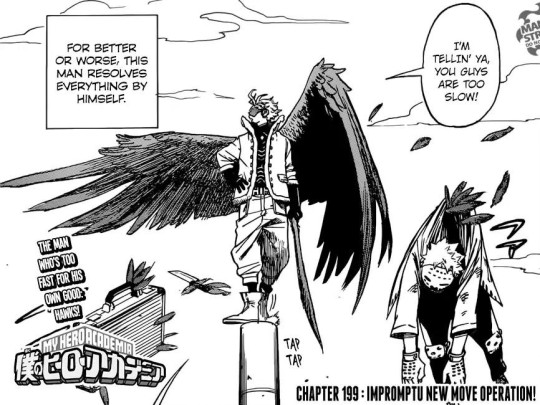
well yeah, Mighty Wings is the type of quirk that allows you to do that. when you can individually control hundreds of little godmode wings that are strong enough to even carry people to safety, you don’t really need much in the way of backup
ah, so it’s confirmed this is Tokoyami’s narration
apparently the U.A. sports festival earlier in the year was the first time Hawks had ever taken place in the whole drafting process
hold up, so did Toko intern with him for both the jr. internship and the real internship? like, he did the weeklong thing following the sports festival, and then went back and interned there for real later? or was it only the first and not the latter?
lol Hawks is flying off to go save some other hapless soul. some out of control drunk dude at a bar in Cantina
I assume Cantina is a specifically a reference to the very famous Mos Eisley Cantina in Star Wars, even though it’s also a common enough word in its own right
lmao his sidekicks are all “yeah so Hawks is just generally better than us in every conceivable way and we just have to live with it”
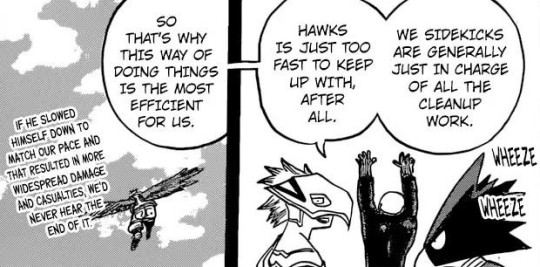
these guys crack me up
so during his workplace experience Tokoyami just spent the whole time chasing after Hawks with these guys and handling the cleanup with them. so naturally it wasn’t long before he started having doubts about the whole thing
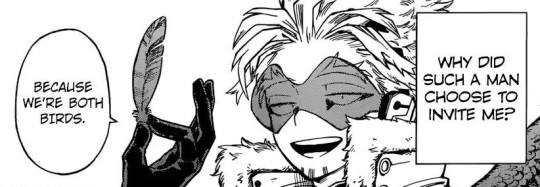
I was literally just about to say “because you’re both birds” and then Hawks was like “yeah, duh”
Tokoyami is asking if he’s joking, because Tokoyami doesn’t have a sense of humor so he probably genuinely needs to know
Hawks says he’s 20% serious. holy shit. that honest to god is what he said lmao
he says he wanted to talk to someone from class 1-A about the League of Villains, and he figured if he had to do so then he should pick someone he thought could keep up with him and who showed promise. and since Tokoyami finished in the top three he went with him
and of course we know from chapter 186 that he had selected Todoroki as well, but Endeavor got him instead

interesting that both he and Bakugou picked the highest ranking agencies on their list and ended up being disappointed. it seems like the people who had the most fulfilling internships were the ones who went with agencies that hadn’t necessarily made huge names for themselves, but were perhaps a little better at this whole teaching thing than some of the big shots
ah, and then Hawks did agree to take him on for a For Reals Internship later on, though
that means Tokoyami actually reached out to him despite his lackluster previous experience. makes me wonder if Bakugou would actually decide to go back to Jeanist’s agency once he gets his provisional and once the kids are allowed to do internships again
(ETA: so I’m honestly not sure if we’re even going to get back to internships again, at least not for a while, but one theory I’ve seen floating around is that Bakugou will intern with Miruko instead of Jeanist, and I gotta say, I really like the idea of that. for so many reasons. but basically it makes a lot of sense; Jeanist is still laid up, Miruko is a top 5 hero, and her personality aligns with Bakugou’s a whole lot more than Jeanist’s did. all this plus Fuck Yeah Girl Power, so hell yeah I’m all for it.)
-- YOOOOOOOOOOO
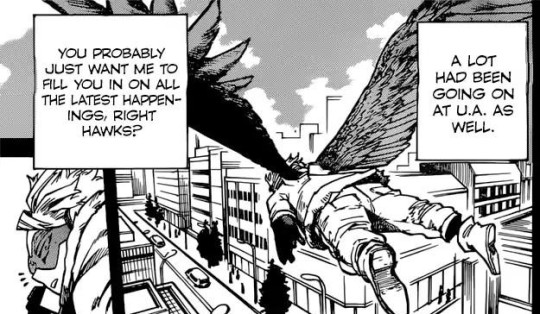
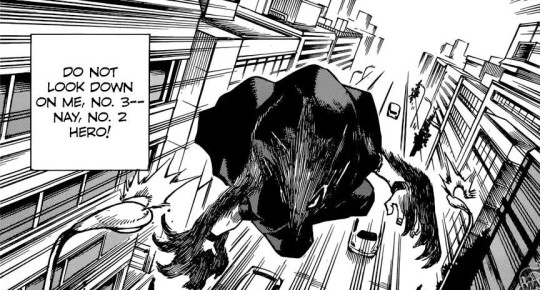
he can -- you can fly, dude? since when lmao what the fuck
(ETA: what is he doing here, though?? I thought he was flying but then a couple pages later Hawks is like “you should learn how to fly” and then a few pages after that everyone is shocked by his new “bitch I can fly now” special move. so it seems like that’s something he came up with after this scene. is he just jumping with style here or what)

Hawks likey! kid’s got some potential
now it’s later that night and Hawks is telling Tokoyami he did good
OH MY GOD
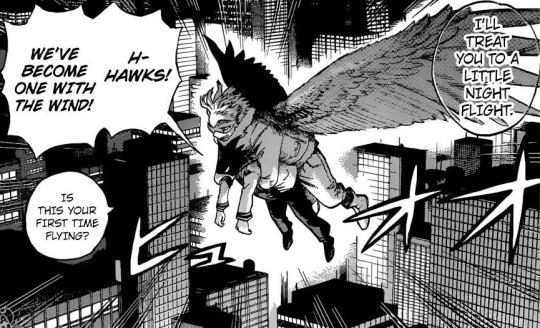
THIS IS THE CUTEST AND BEST THING THAT’S EVER HAPPENED. OH MY GOD. YOU GUYS. I CAN’T IT’S TOO FUCKING PRECIOUS OH SWEET JESUS
(ETA: so as you can see I was enchanted by this scene even before I learned about its significance as a beloved fandom meme. anyways so we all agree that this internship was destiny.)
TOKOYAMI IS SO OVERWHELMED. HIS POETIC SOUL IS SOARING LIKE AN EAGLE
OH MY GOD!!
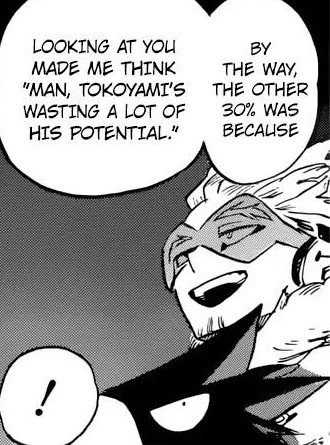
HOW DOES HE REMEMBER THE CORRECT PERCENTAGE BREAKDOWN FROM A JOKE CONVERSATION THEY HAD LIKE SIX MONTHS AGO
SERIOUS QUESTION WHY IS HAWKS THE BEST CHARACTER IN BNHA. ANSWER ME. SOMEONE
AND LOOK AT TOKO’S FACE OMG
AHHHH
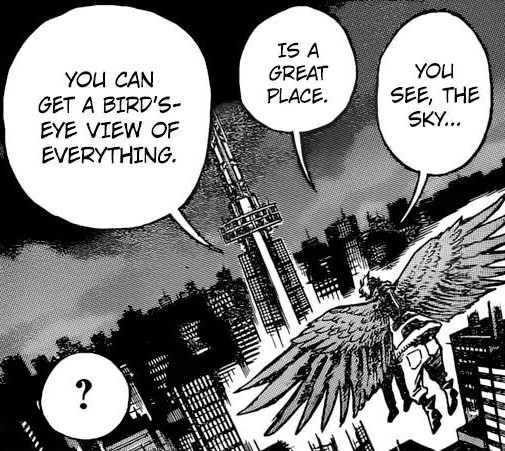
it’s so personal, though. like I honestly feel like he’s baring a bit of his soul to this kid, and for someone with a personality like Hawks’s that is huge
he says he’s not especially interested in nurturing the next generation, “but...”
well that’s fine dude. you’re practically still a kid yourself and you’ve got more than enough on your plate
but the fact that he does have so much on his plate makes me wonder what’s going through his head right now. because the whole workplace experience was before he started his undercover mission, but this scene is taking place afterward. and he always plays it cool, but that shit is dangerous, like one-wrong-move-and-you’re-dead-or-worse types of danger. and that’s not even taking into account the bad-for-your-soul parts that come with having to turn a blind eye to certain things for the sake of maintaining your cover for the greater good
so basically, despite what he says, he may just be feeling a bit more sentimental or brooding or whatever than usual, and maybe that’s what brought this on. he never particularly wanted to be a mentor, but hey, might as well give it a shot. life is short
so Toko’s asking what he meant when he said Tokoyami was wasting his potential
and Hawks says that while Tokoyami is doing a lot to cover his weak points, he shouldn’t neglect improving his strong points
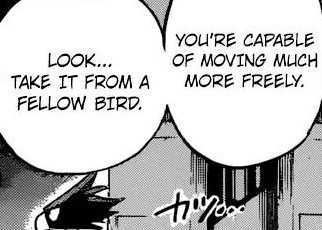
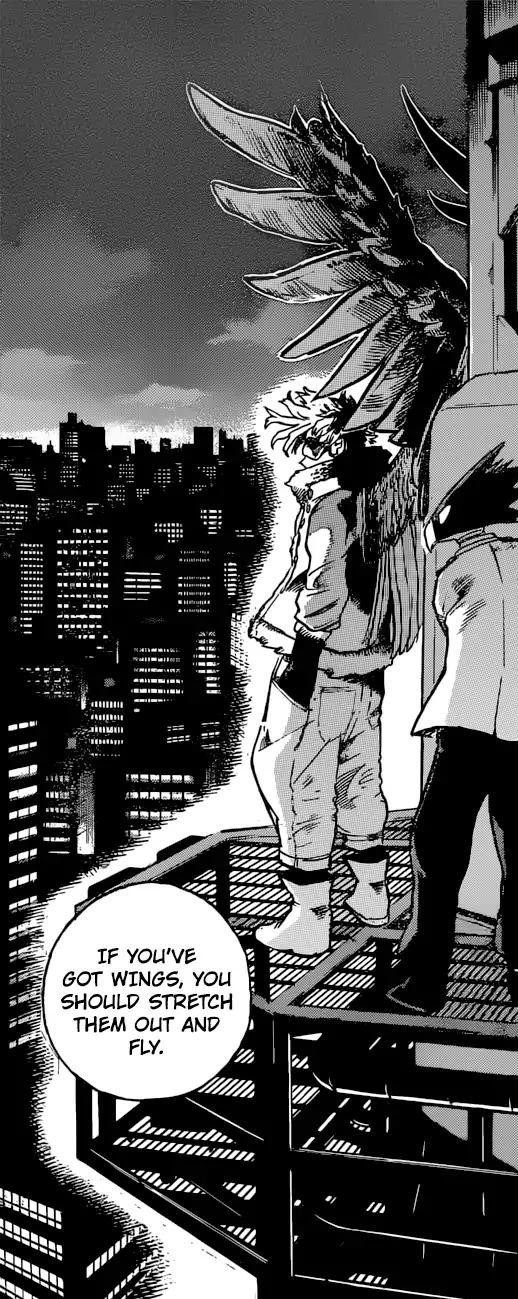
one moment please while we process these Hawks feels ladies and gents
aaaaaaand done
my boy just wants to be free. okay. that’s fine. I’m fine it’s all good

nothing to see here, just some solid mentor advice pulling some double duty as a deeper look into Hawks’s psyche at the same time. just Horikoshi things
and we’re back in the present!
that was a much lengthier flashback than I anticipated, and thoroughly enjoyable! very nice!
so Kuro is blending back into the shadows and for some reason everyone is surprised
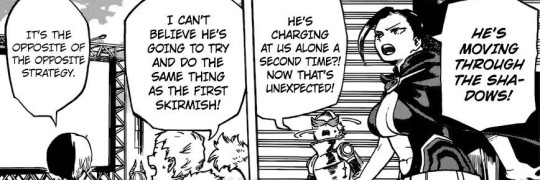
what else would he do. I mean. if it ain’t broke
so now he’s mocking them from somewhere in the piping, bragging about how they can’t tell where he is
oh shit!
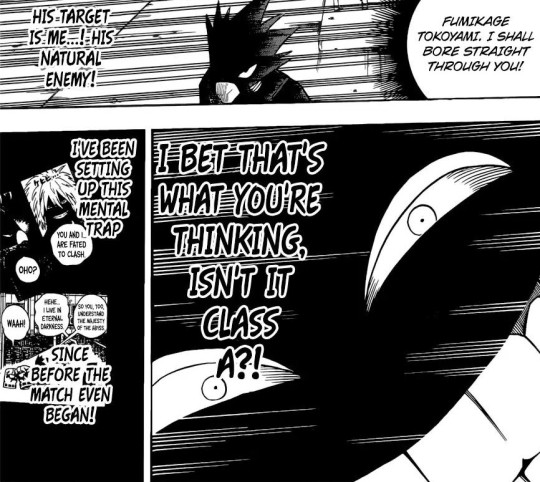
so he’s planning on targeting one of the others? tbh that probably would have worked just as well even without the red herring, since they can’t see him coming

like, this would have worked no matter what though. but I guess it did get Aoyama to lower his guard
LOL MY POOR GLITTER BOY
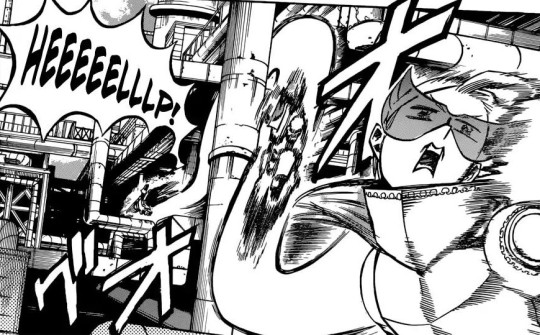
FIRE YOUR DAMN LASER KID
ooooh
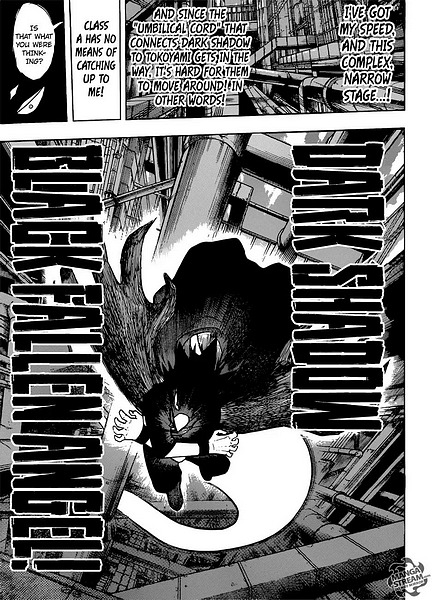
it’s so gross that he refers to it as an umbilical cord and now I’m never not gonna be able to think of it as that
so anyway, I’m guessing that this special move works by having Dark Shadow fly somewhere and then instead of retracting the shadow back to him, he pulls himself toward Dark Shadow
LOL

what, y’all didn’t see those flashbacks with Hawks just a few pages ago. pay attention to other characters’ life stories
ah, here are the mechanics explained to us in a cute little comic
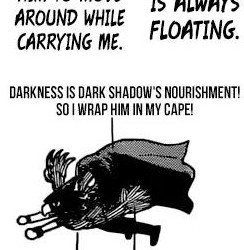
“Dark Shadow can fly so one day I was like, ‘ohh... pick me up so I can fly too. fucking duh’”
also has the bonus advantage of distracting opponents with how shockingly adorable it is
so now he’s plucking Aoyama out of Kuro’s clutches
I bet Aoyama’s pissed that his cape broke in the process though
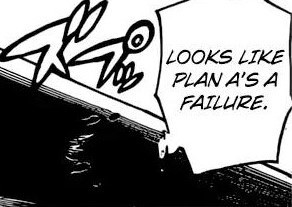
LISTEN HERE BITCHES, Y’ALL ARE GONNA NEED PLAN B, C, D, ETC. BEFORE YOU CAN EVEN COME CLOSE TO TAKING OUT MY GIRL MOMO HERE. YOU’RE GONNA RUN OUT OF LETTERS OF THE FUCKING ALPHABET YOU AMATEURS
she said, but also I’m still pretty sure they’re gonna lose fffff
since Aoyama and Tokoyami are now perfectly positioned, Momo’s telling Aoyama to use his navel buffet
ah I see, eliminate Kuro’s potential hiding places by blinding him with Aoyama’s splendor
so Dark Shadow is covering himself in Kuro’s cape and Aoyama is letting ‘er rip
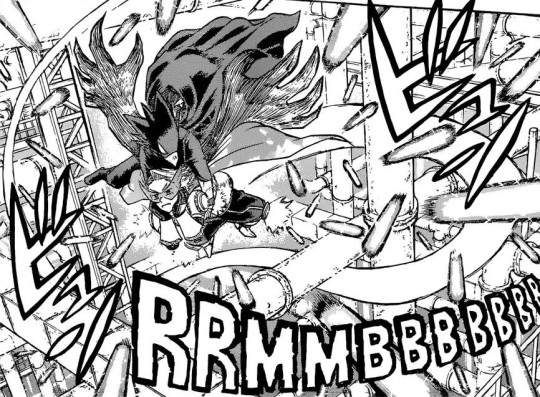
this is such an odd and perfect sound effect and I’m really impressed with Horikoshi for coming up with it in English
aha!

GOTCHA MOTHERFUCKER
now Momo’s calling Hagakure to action, and for a moment I was like ‘why’ but then I remembered her special move
but before we get to that, please enjoy this Yaoyorozu Momo “just as planned” panel

yessssss now get ready for --
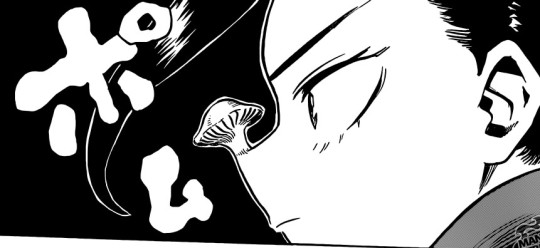
...

okay what is plan B
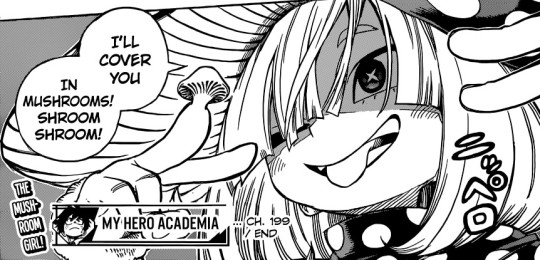
...
and the chapter ends. of course
chapter 200 is gonna be some wild times isn’t it. lol
#bnha#boku no hero academia#tokoyami fumikage#hawks#kuroiro shihai#aoyama yuuga#hagakure tooru#yaoyorozu momo#bnha spoilers#mha spoilers#makeste reads bnha#tomorrow's chapter features one of my all-time most hated quirks#as well as one of my all-time favorites#manga's quirk is one of the most original and badass things I've ever seen#but oh my god those mushrooms#I'm already cringing just thinking about it#I don't want to have to look at those panels again#sob here's hoping I survive
72 notes
·
View notes
Text
Relationships are hard
I wrote another blog post recently. It talked about an angry demon inside of me, filled with rage and jealousy, that has recently made its appearance into my life again.
I didn’t post it.
For fear of being seen as the monster. For fear of seeing myself as the monster.
Recently, I’ve been down. Like, really down. To a point where my loving and caring boyfriend called me to talk about a rather hard incident that happened to him that day and I ended up complaining to him about my day instead. He told me: “We’re both in a really bad state of mind right now, huh? I’m just going to hang up and we can talk later because neither of us are benefiting from this, obviously.”
The past couple of weeks I haven’t been able to “stabilize” myself. I’ve been struggling with adoption issues (happy birthday to me in a few months, and hello to my abandonment issues), self-identity, and, you guessed it, relationships.
It always seems to come back to relationships in my blog posts, huh? This time, it is not relationships with those around me, but my relationship with myself.
I know many people who disagree with the quote “You can’t love others until you love yourself first.” However, I find it to be true for me.
Time periods filled with self-doubt and anger, sadness and loneliness, I tend to lash out, or sit in a slump when I could be reading or playing video games. I cry because I dropped my ice cream spoon on the carpet. I scream because the dishes weren’t done. I become, essentially, a 5’2” demon.
However, it is the “not-quite” periods that are the hardest. When I am not quite angry all the time, but it seems anything sets me off. I am not quite lonely, but I find it difficult to reach out to talk to anyone. I am not quite sad, but if I misread the tone of a text, I’ll become upset.
In these moments, I have found that maintaining a relationship with myself seems almost impossible. I will pick apart every single mistake I made, and go over it a million times until I forget that it was merely a minor spelling error in an email to a coworker. I will be vague as possible in messages, hoping that no one asks “how are you” because I don’t know how to respond. I will stare at myself in the mirror and point out every piece of myself I hate.
When I remember (and trust me, it is really hard to remember sometimes), I look at myself – at my brown eyes that I find to be such a dull brown, with straight lashes that won’t curl, and mono-lidded so that basic makeup tutorials never quite work out right – and I whisper, “Hey, it’s okay.”
Oftentimes, I’ll cry right after that, and let sobs consume my body as I tell myself over and over that it is okay and I watch my reflection as it cries and breaks down, but know that it will be over. It will pass.
Afterwards, I try to do something that makes me happy. Usually, that means eating. Sometimes I write or read, sometimes I get out my DS, but most of the time, food does the trick.
Sometimes it takes hours, sometimes it takes days, but after constantly reminding myself in the mirror that I’m okay and will be okay, I manage to readjust. I can face my problems like an adult, and dissect them using both logic and emotion. I’m able to talk about why I feel certain things, and actually modulate my emotions. I will begin to text others normally again, and be able to listen and empathize with my significant other when he talks about the annoying kid in his class. Slowly, I emerge as my former-self, but I like to think of myself as stronger. I don’t know if that’s actually true.
Relationships are hard, but the one I struggle with the most is the one with myself. But hey, that’s okay, I’ll keep moving forward and growing.
#littlelilybigworld#tumblr#writing#spilled ink#blog#writer#life#thoughts#personal#self care#self love
3 notes
·
View notes
Text
The Summer of Adventure: Chrono Cross

Original Release Date: November 18, 1999 (JPN)
Original Hardware: Sony PlayStation
Chrono Cross is a game that just about every fan of JRPGs has an opinion on. Put in the unenviable position of having to follow up on what many consider to be the best game of all-time in the genre, Chrono Cross chose to take one of the most difficult routes possible. It is undeniably a continuation of the events of the first game, with its main plot serving to tie up one of the loose ends from Chrono Trigger. At the same time, it doesn't seem to be bound by that game at all. At times, it even appears to treat it with contempt. I want to say that Chrono Cross would have been better off as a stand-alone game, but I'm not sure it could have drawn out the same level of emotion from players had it gone that way. Chrono Cross was praised to an almost ridiculous degree when it first launched, but the backlash on it in the years that followed was one of the biggest I've seen in my whole time in the hobby. What's the deal?
Chrono Trigger released with a bang in 1995, riding on the back of a dream team of talents including Final Fantasy creator Hironobu Sakaguchi, Dragon Quest creator Yuji Horii, and famed Dragon Ball artist Akira Toriyama. Its excellent graphics, progressive mechanics, and compelling time travel hook made it an instant winner. Even with more than 20 years down the road, the game is considered to be one of the finest JRPGs and Super NES games. Some would even put it on their short list of the best games of all time. I have friends who make a yearly playthrough of the game a priority, squeezing the game's finite contents for every last drop of enjoyment possible. It's been ported to multiple platforms including the Sony PlayStation, the Nintendo DS, and iOS.

Its sequel would face different circumstances. That dream team had moved on to other things, leaving the less flashy staff members who had shouldered a fair portion of the load of the first game, albeit behind the scenes. The director's chair was occupied by Masato Kato, a well-known game writer who helped pen the stories for Chrono Trigger, Final Fantasy 7, and Xenogears. This was only his third turn as a director, with previous credits on Ninja Gaiden 3: The Ancient Ship of Doom and the Japan-only Satellaview visual novel Radical Dreamers. Perhaps notably, Chrono Cross is also the last game he directed. Naturally, he also provided the story for the game. The game was produced by Hiromichi Tanaka, who would soon take point on Final Fantasy 11. The character designs were provided by Nobuteru Yuki, best known for his work on the anime series Escaflowne.
Considerable talent, to be sure, but the change in directors, designers, artists, and producer made for a game that looked and played almost entirely differently from its predecessor. Besides Kato, the one big returning name was composer Yasunori Mitsuda, the man who had worked himself sick in his composing debut on the first game. Having put a few more games under his belt, Mitsuda was ready and able to deliver a stunning soundtrack that I still think is one of the greatest of all-time. While Chrono Cross had a whole new look and a more confident sound, it was still a great-looking game with some very progressive ideas of its own. One box that would remain unchecked, however, was the time travel motif. There is a little bit of time travel in the story, but you're not the one doing it. Instead, Chrono Cross focuses on crossing between parallel worlds. It's an interesting concept that plays well to Kato's strengths as a writer.
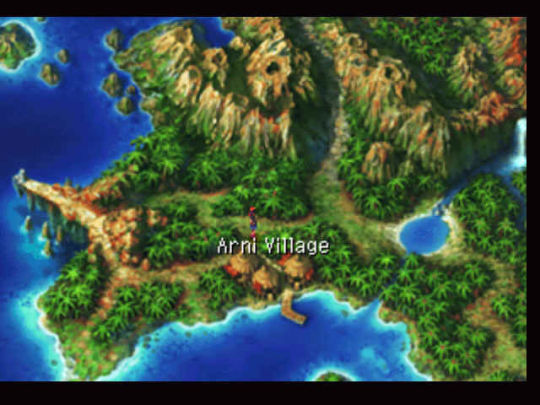
Interestingly, Chrono Cross was the third kick at the can for a sequel to Chrono Trigger. The first, Radical Dreamers, covers part of the same narrative ground. Released only in Japan and exclusively through the Satellaview download service for the Super Famicom, Radical Dreamers introduces some characters that would reappear in slightly altered forms in Chrono Cross, along with a short scenario that would also show up in the latter game. This was only ever meant as a side project, largely existing simply because Kato was annoyed by the loose ends the plot of Chrono Trigger had left. The next potential candidate was the game that would become Xenogears. Initially pitched as an idea for Final Fantasy 7 before another idea won out, it then was planned as a follow-up to Chrono Trigger. After a lot of disagreements, it ended up being its own thing, though it's not hard to spot the connections between it and Chrono Cross.
It was after Xenogears wrapped that Square officially put together a team to create a new Chrono game. The creative talents involved have given some conflicting reasons for the game's dramatic departure from the original game, but the gist seems to be that they didn't feel like rehashing things. They felt doing time travel again would be a cop-out, that a new cast would appeal to potential new players, and that it was important to take full advantage of the new hardware they were working with. As both Tanaka and Kato have strongly asserted, the game's title is not Chrono Trigger 2, so fans probably should not have expected a direct sequel. That kind of feels like a post-hoc excuse to me, but it is what it is.
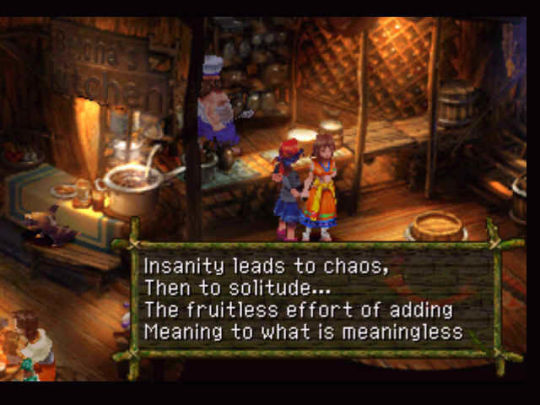
The game released in late 1999 in Japan, but its overseas release would end up coming in August of 2000, not too far ahead of the PlayStation 2 launch. As a highly-anticipated sequel and the culmination of the Summer of Adventure marketing campaign, Chrono Cross came out of the gates like a rocket. The reviews from critics were nearly unanimous in praising the game, with some publications breaking the safety glass on their rarely-used perfect scores to really underline the point. I distinctly recall a major backlash towards American magazine Electronic Gaming Monthly because one of their three reviewers dared to give the game a score of 9.5 out of 10 instead of a perfect score. Given the many shared circumstances between Chrono Cross and Legend of Mana, it's interesting how different the initial reception to each was. But for however much Chrono Cross diverged from Chrono Trigger, it was still quite recognizable in broad strokes. I think that's what saved it from the more immediate negative response its stablemate received.
That said, the negative response did eventually come. It felt like the bigger a fan a person was of Chrono Trigger, the worse they would eventually see Chrono Cross as. Cross had a different, less optimistic tone to it. Rather than focusing on a handful of characters, it chose to spread the love across a huge cast, hoping to fully sell both its world and its high concept. The story broke one of those unwritten rules of fiction. If you give the audience a "happily ever after" ending, revoke it at your own peril. That's just what Chrono Cross did, and it didn't even make a particularly big deal about it. Chrono and Marle died off-screen a long time ago in some random attack from the Porre Army. Lucca's death is an important plot point, but it also happens before the events of the game. Robo at least gets a significant end, but he too does not survive. Ayla, Frog, and Magus don't even appear in the game, with the latter's absence being particularly preposterous as this entire game orbits around his sister, Schala.
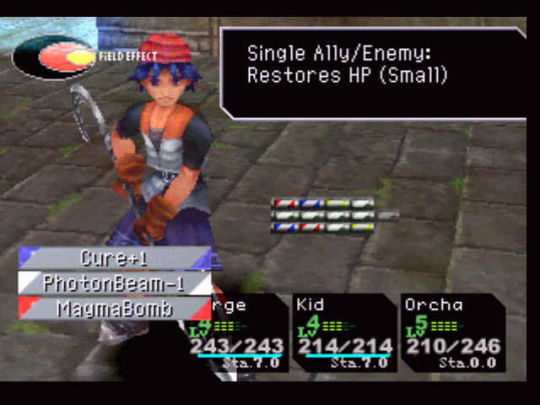
Just in case you think you can delude yourself into thinking the main three aren't really dead, their ghosts actually appear a few times during the course of the game. In short, it was all for naught. Nobody from the main cast of Chrono Trigger got a happy ending, as far as anyone can tell. Heck, you didn't even really save the world. This didn't sit well with many players. Others were put off by the lack of time travel, perhaps expecting there would be some instances later in the game. Even those who could get around these attachments to the plot and characters of the first game were faced with an experience that was almost antithetical to Chrono Trigger.
That game was a fairly light, fast-paced, moderately linear game that wore its messages on its sleeves. Chrono Cross, by comparison, is kind of depressed with existence. The pace is slower, the tone is darker, and the messages are muddier. Although the finished game was heavily pared down from the original plan, it probably could have done with a few more editing passes. For every really interesting, thought-provoking point in the game, there are at least two bits that don't seem to have much purpose at all. Maybe that's intended, though.
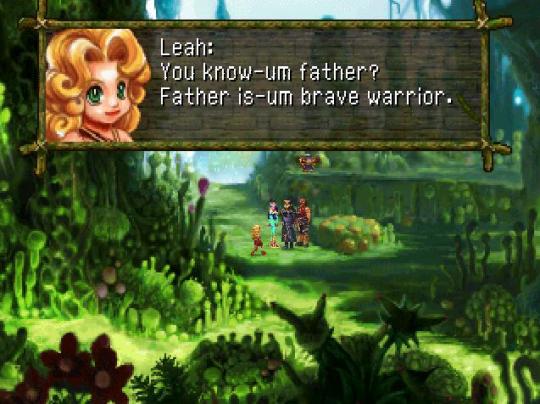
Cross serves as a fascinating counter-point to Trigger in some ways, however. In the latter, your intervention is, as usual for the genre, undoubtedly a good thing. Apart from the early set-up where Marle almost writes herself out of existence, your time-hopping shenanigans never have a negative effect on things, at least as far as you can see. Your presence makes the world a better place, even though you are breaking virtually every fundamental law of nature in doing so. The game ends without addressing this particular karmic debt, and that's fine. It doesn't have to. It's not that type of game.
Chrono Cross has something else to say, though. The premise sees your character Serge traveling to a parallel dimension where he was killed at a young age. After 10 years, this other dimension has a ton of differences compared to your home dimension. The kicker is that many of them make for a better world. Some people are worse off, mind you. But the key is that your existence doesn't make things better for everyone. Indeed, Serge not dying has downright ruined some people thanks to that trusty old Butterfly Effect. One of the more enjoyable aspects of the game is in seeing how people's lives are going in each dimension. At any rate, Serge's death is a good thing for some people. A fact that becomes all the more painful when you discover that Serge was really meant to die. His continued existence comes through unnatural means, and even poses something of a threat to the world order.
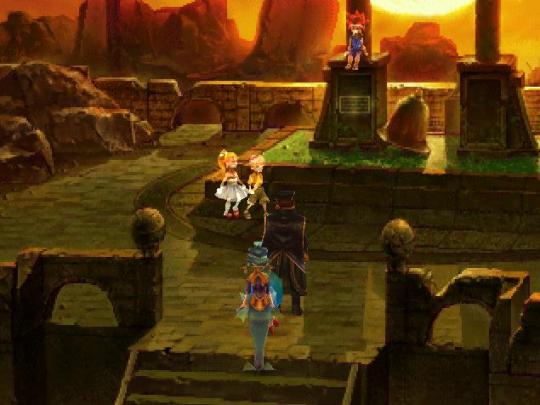
This isn't just told to the player, either. There are a number of situations in the game where you have the option to make an active choice versus just passively letting things play out. In some of those cases, your decision to act makes things much worse for everyone, while inaction ends up with the desired result. Like many of Kato's other stories, Chrono Cross eventually ends up being a little bit too on-the-nose with its theme, with a primary antagonist literally named FATE. From a personal point of view, fighting fate is a good thing for Serge. It keeps him alive. But in many ways, it's a purely selfish act of self-preservation. It only accidentally has a good result. Of course, this is all the work of a seriously convoluted plan on the part of Balthasar, the Guru of Time. It seems that pesky old Lavos is still alive and threatens to merge with the missing Schala. Balthasar set all of the events of the game in motion to bring Serge to the point that he could defeat Lavos, preventing it from becoming a Time Devourer and eating all of time and space.
Like the first game, Chrono Cross has multiple endings. The best one involves trying to squeeze out a puzzle-like sequence of special attacks on the final boss, a sequence that you may or may not pick up on from the clues. Should you manage to pull that off, you'll save Schala and be treated to a somewhat bizarre ending where she ponders the meaning of life in the face of evolution and survival of the fittest. It's pretty clearly Kato talking at this point, mind you. Schala concludes that although individual lives may seem to be meaningless if they aren't significant in the evolutionary sense, every being does its part to lead up to those significant examples. Thus, every life is an important part of the chain, so life isn't meaningless after all. Phew, thanks for sorting that one out.
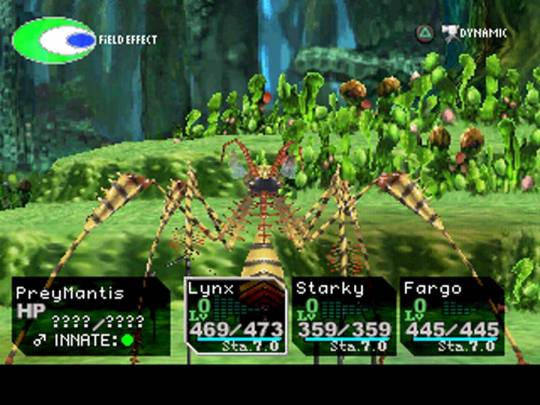
She then signs her letter off in Kid's distinct Australian accent, indicating that her memories have been combined with those of her clone. She promises to find you again someday, sometime. The credits then roll, as a woman who is supposed to be Schala can be seen wandering around various locations in modern-day Japan. It's apparently meant to signal to the player that their very own Kid might be out there somewhere, searching for them. It really only works if you live in Japan, though, since the locations they picked are probably not going to strike a chord with anyone else. To be honest, this is a game full of good ideas and compelling situations, but its main plot ends up collapsing on itself in a way that is highly characteristic of Square games from this era.
This was only my second time playing the game, if you can believe it. I really enjoyed it the first time, but I was definitely high on hype. I wasn't sure how I would end up feeling about it after so many years had passed. I've seen my opinions of Square games I once held sacred turn around in big ways before, and I worried that this might be one of them. At the beginning of the game, as I was enjoying the music, brightly-colored sights, and interesting set-up, I felt that I had perhaps underestimated Chrono Cross. The further in I played, however, the more it started coming back down to Earth. There are too many inconsequential characters, the storyline loses its coherence partway through, and the battle system takes a little too long to sort through in basic skirmishes. This is also a game that virtually demands a guide, and even with one, you're not able to see everything in one playthrough. That's fine, but I don't know that I really want to play this again for a long while. Even the first time, when I was absolutely in love with it, I moved on to other things after getting the best ending.
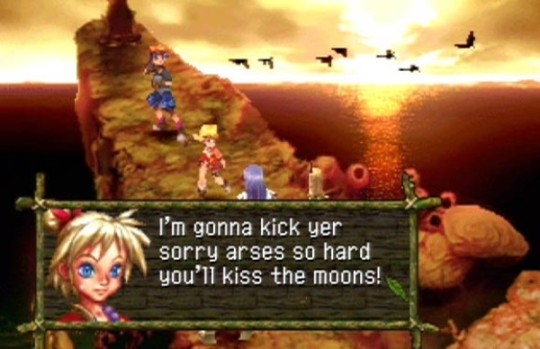
Being a little older and more experienced, I can certainly appreciate some of the ideas the development team tried to apply to the mechanics. That final boss "puzzle" is pretty bad, but in most other respects, I think the element system that governs skills and item use is quite clever. It's a little too restrictive early on, but I like the idea of forcing players to choose carefully what they want in their toolbox. It's a good idea to have a diverse set of skills ready, but if you want to take advantage of field effects, you have to stack certain elements. You might also want to set up a custom set of elements for individual bosses in order to exploit their weaknesses. The only real down point is that this involves a lot of micromanagement that quickly becomes tiresome and isn't totally necessary. I suspect most players will just roll with a general load-out of elements and only change out individual pieces now and then.
I'm always interested in how games try to circumvent grinding. It's been an issue virtually since the inception of the RPG genre, and it's honestly debatable as to whether it's something that needs to be addressed. If players like it, why not give them the option? I guess the problem is that while grinding is often the path of least resistance, it's not fun for everyone. Since it's the most mindless thing to do, people will opt to do it in lieu of trying to reconsider their strategies, even if they don't enjoy it. That leads to people coming away with a poor impression of a battle system that probably would have thrilled them if they had played it without grinding. I think the Japanese focus on intricate combat systems naturally results in designers trying to crack this particular nut.
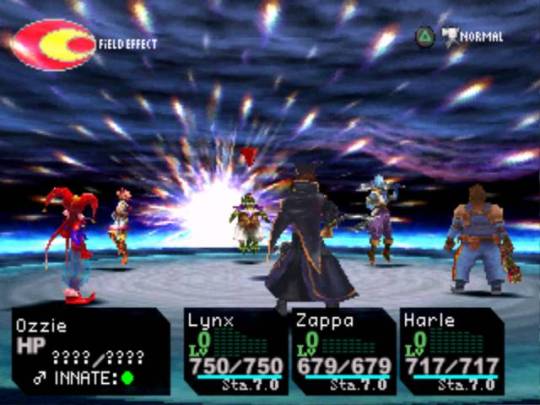
Chrono Cross's approach is to put in hard gates on growth that are connected to your progress in the story. You're given a star ranking that determines how far your party members can grow. Your stats will only see so many gains until you earn a new star by clearing a story boss of some sort. There are other incentives to battling enemies, such as giving you drops that you can use to create new equipment, but you can't simply grind your way past a tough boss. You have to plan your way through it. Luckily, one of the other unique quirks of Chrono Cross assists with that. You can run from any encounter, up to and including the final boss. No, it doesn't make sense from a narrative standpoint, but it makes this one of the fairer RPGs around. Go in, see what elements will serve you best, and if you don't have them, escape.
I think it's that desire to pick away at the accepted standards of the genre that ties the game to its predecessor more than anything. Unfortunately, that's the least likely thing to be appreciated by fans looking for more of the thing they liked before. On top of that, the desire to push the genre in new directions doesn't always work out the way a game's creators might hope for. I don't think anything in Chrono Cross went spectacularly badly, but not many of its innovations proved to be influential. That goes hand-in-hand with its weaker reputation compared to that of Chrono Trigger.
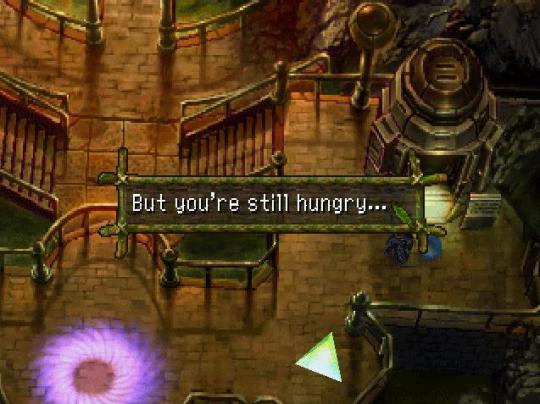
While Chrono Cross isn't entirely forgotten, it does seem like the series as a whole is finished. Chrono Trigger probably has a lot of re-releases in its future, but I'm less confident that Chrono Cross will show up again as anything other than a PSN download. Even Kato's attempt to tie the two games together more strongly in the Nintendo DS port of Chrono Trigger failed to re-ignite interest in Cross. I suppose that speaks to the difficult balancing act that sequels have to pull off. If a game rehashes too much, it will never escape the shadows of those that came before it. On the other hand, if the developer either fails to or chooses not to recognize the qualities that fans appreciated in the original game, history can be swift with the write-off there, too.
It's often the case that when I replay a game, I come away with greater clarity concerning my feelings about it. But even after making my way through Chrono Cross again, I find it hard to nail the game down. I kind of love it. I also kind of hate it. I wish they had cut the fat off it as much as they had with Chrono Trigger. Some of the themes it brings up are brilliant, but others seem like so much belly-button fluff. I think it's a more interesting, more challenging game than Chrono Trigger tried to be. That it failed in many of its ambitions doesn't affect the respect I have for that particular approach. Some small part of me, however, would have been far happier with a safe sequel in this case.
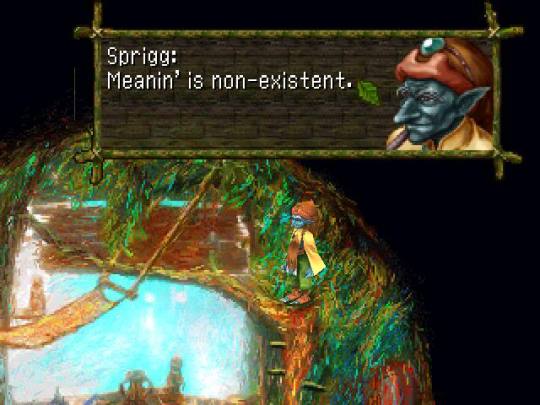
Previous: Threads of Fate
If you enjoyed reading this article and can’t wait to get more, consider subscribing to the Post Game Content Patreon. Just $1/month gets you early access to articles like this one, along with my undying thanks.
1 note
·
View note
Text
"Elaborate games of death are the best way to solve any problem." (Violence & trauma in 999)
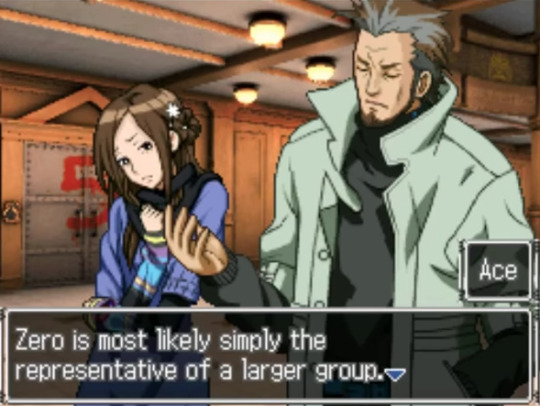
A while back, I translated this Famitsu interview Kotaro Uchikoshi gave right after 999's Japanese release to answer lingering player questions, and I was struck by the number of times that Uchikoshi chalks stuff up to "well, it had to happen that way because that's the way it was in the past." That sounds like a cop-out and, even with the game's Sheldrake fixation, it kinda is. After reading the 999 novelization (synopsis here) and mulling over the changes it made to the game's story, though, I began to look at these comments in a different light - they seemed to speak to a more psychological parallel reason behind the goings-on, one that dovetails with what the game has to say about violence.
Cutting for endgame 999 spoilers - right in the first sentence, so watch out! (Also, a) this essay refers to the DS version of 999, not the iOS or upcoming Steam/PS4/Vita versions, and b) this material may have been discussed previously elsewhere; mea culpa if it's not blindingly original insight.)
When I played 999, I was actually disappointed in the idea that Akane was Zero. I didn't buy it - Akane was, it then seemed, played up as such a fainting damsel and "lovable girlfriend" character in the game that I couldn't buy her as a bloodthirsty, calculating mastermind. Then the novel handed me a version of the story where Akane wasn't Zero, and it demonstrated how that idea didn't work - how Akane being Zero is central to the game's core theme.
The main thing that the novel loses in its portrayal of the Kurashikis (Akane in particular) is the game's commentary on how people are changed by trauma. It pervades 999 the game, though I didn't realize it until the novel took it away.
Now, we're all familiar with the mechanical significance of the morphogenetic field etc. in 999's scenario and how the plot hangs together "scientifically" and "logically," for Art Bell values of science and logic. Stories, though, often derive their power from how they map to more relatable, everyday touchstones in the human experience. So let's take a look at things from a symbolic perspective: what are Akane & Aoi trying to do by staging the new Nonary Game, basically? Recreate the circumstances of their past trauma and have things go right this time. The entire Sheldrake/Nonary Game setup, where a "repaired" echo of something in the present can rewrite the past, is a fictive equivalent of the coping tactic of replaying a distressing incident in one's head, except with a favorable outcome to make things better - Akane is trapped in the past in more ways than one. In the mental made literal, Akane and Aoi dedicate themselves (and others) to running through their trauma over and over again - except, given the device of the morphogenetic field, they actually can rewrite the past (or resolve the time paradox favorably, if you will) and get a good resolution on one of their runthroughs, if the conditions are right. The idea is that once this process is successfully completed, as is the hope with many therapies (even misguided ones), Akane will be able to self-actualize and move on - except here, given Akane's Schrödinger's cat situation, this self-actualization is painfully literal.
(This brings to mind the old observation about how in good fantasy, the emotional needs of the characters and the themes of the story shape and determine the nature of the magic powers, instead of the powers being shaped by ornamental or other arbitrary considerations. It's no mistake that the particular brand of pseudoscience that drives 999's plot focuses on how the past influences the present in unseen ways, and how the past causes its own repetition and perpetuation.)
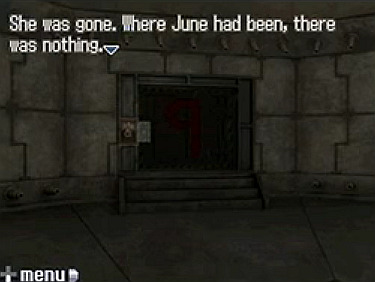
In these circumstances, the traditional happy ending would never work, as dealing with trauma doesn't result in an instant happy ending; you're just finally able to move on (as Akane, again very literally, does by driving away from the scene of her rehabilitation without additional entanglement). If we look at matters from the protagonist's perspective and priorities, though, there's another reason why Junpei can't have a happy ending: the Akane Junpei knew no longer exists. The violence visited upon her changed her and made her a different person. It's not a coincidence that once the player understands whom the current Akane really is by understanding the actions for which she's been responsible in the game, "June" disappears from the narrative in the current sense. There isn't any heartrending, revelatory confrontation or goodbye between her and the rest of the cast; she just totally ghosts. Akane narrates, and Junpei can communicate with past Akane, but "June" as we knew her throughout gameplay can't stay in the active narrative, as she's a conscious construct meant to reawaken Junpei's memory - a means to an end (and, perhaps in part, a role that allows Akane to enjoy for a few hours what might have been had things gone differently). June might have been an evolution of an Akane who existed before the Nonary Game - but the present Akane is no longer Junpei's Akane and hasn't been since the incident. June's total disappearance is meant to signal this definitive break.
Other details of the story of the participants in the first Nonary Game mirror those of real-life trauma victims in notably specific ways. They're not believed by the authorities (a depressingly common phenomenon with victimization), because their victimizer is in a position of prestige and power (ditto). What do Akane and Aoi want from their assailant? Not death, but a public acknowledgment of what he did to them. The vindication and validation of their account and feelings that they were previously denied - which only Ace can give them - mean more to them than obtaining vengeance through death (which they have no problem orchestrating for their ancillary tormentors).
Then we learn (in supplemental materials) that their assailant was himself brutalized in the same way and himself has been obsessed with reliving his past. He, however, has not even a morphogenetic plot reason for using the Nonary Game as the vector of his research; he does so only because he's mentally obsessed with it. He can't move on from his trauma and instead inflicts it upon others - a trait that defines those responsible for the misery in the story.

The cycle of violence is also acutely depicted in the two characters responsible for the game's most memorable acts of bloodshed: Snake and Clover. It's telling, and consistent, that out of the present-day Nonary Game's innocent targets, the characters who have previously been the direct victims of violence prove to be the ones most capable of violence themselves. Contrast this to Junpei, Seven, and Lotus, who are not direct victims of the Nonary Game from nine years past, at least not in the deeply traumatic manner of its helpless young test subjects: though Seven can play enforcer and Lotus and Junpei both attempt shady maneuvers involving doors, none wreak anything approaching the charnel of the Axe ending or the cavalcade of vengeful horror in the incinerator. (It's interesting to note that the most passive-victim ending, Sub, is experienced from the perspective of the Junpei-Seven-Lotus triad - who find out nothing and can only be slain as bystanders, swept up, symbolically, in a huge tableau of violence they can only view from outside and whose motives they don't understand at all.)
Snake and Clover, though, commit violence only in the relative heat of the moment, when the very worst is inflicted upon them unameliorated; their acts lack the long-term premeditation of the Kurashikis or Gentarou Hongou. Elsewhere in the game, they are used as a contrast, an alternative path - to emphasize the importance of a healthy response to trauma. Snake is the game's standout character, but why is he so remarkable, really? He has survived trauma - losing his sight - yet moved on to thrive in its aftermath. Small wonder, then, that he is one of the most capable players, the biggest help in negotiating the Kurashikis' miasma of personal pain; there's no question why, in the right path, he's Junpei's guide to unraveling this morass and not, say, something like the note in the safe. When he is absent, this task falls to his sister (and fellow trauma victim) Clover, and she will rise ably to it - provided she does not fall prey to the fresh horror inflicted on her. Given the themes of the game, it is no coincidence that a great deal of the path to the good ending in 999 involves ensuring that Clover doesn't let the fresh trauma of her brother's assumed death consume her. And who is responsible for the "hope, faith, love, and luck" mantra that greatly contributes to bringing Clover out of it (and helps the young abductees on the Gigantic in the first Nonary Game get through their ordeal)? Well, of course.
(It is noteworthy that while it is Aoi who first tells Junpei of the "Hope, Faith, Love, and Luck", he does so specifically in an act of repudiating it.)
(Note: VLR spoilers ahead.)

Now, I don't like 999's sequels at all; they have a markedly different attitude toward violence, embracing it Saw-style after the most perfunctory bits of hand-wringing. To me, 999 is a self-contained story. But I feel the few details we get of Snake and Clover's life decisions in Virtue’s Last Reward, and the siblings' complete absence from Zero Time Dilemma, actually work as extensions of their function in 999's narrative.
VLR posits that after the events of 999, Clover and Snake were asked to join a secret organization supposedly dedicated to stopping a group of terrorists. (The specific branch they are asked to join is composed of their fellow first Nonary Game victims, headhunted for the same pseudo-psychic powers that got them selected for the game.) The organization is not under Akane's purview, but its cause is strongly identified with that of a group led by Akane. The Fields, however, refuse at first - as VLR Clover says, they want to "move on" with their lives; only when old friend Seven makes a personal appeal do they yield.
Snake and Clover's behavior may seem selfish, as the group's cause is on its face a noble one - and they are ultimately moved by it, after all - but I think, in a way, their initial resistance speaks to something good in the Fields: they decidedly do not want their past trauma to define them. They are reluctant to join a group that largely defines them by their role in the past Nonary Game (one that is, perhaps not coincidentally, largely ineffectual, as we hear of not one success in several missions; again, reviving old trauma proves to be a poor starting point for an endeavor). When their mother tries (understandably) to ensconce them in bodyguards in response to multiple kidnappings, they bolt to start their lives anew - and they succeed in carving out a niche for themselves, and are happy and fulfilled. The Fields are well-adjusted and have successfully moved past their trauma.
The Akane of VLR, however, has not fared as well - perhaps unsurprisingly given the method chosen for her salvation, her recovery has not taken, and she cannot move on from her past. Of all the infinitely more efficient options surely available to a woman of her talents and resources, Akane yet again resorts to a game of death and victimizing strangers to solve her problems; like Ace (another organizational head whose wealth and power should have afforded him better options than the path he took), she repeats the pattern of her past trauma, still mentally trapped by it. (Yes, VLR attributes the game to Klim, but Akane is the de facto mastermind.) Her recreation of her trauma continues right down to the separation of siblings with her potentially permanent separation of Clover from Snake, seemingly needless for any reason except obeying the dictates of her own ensnared mind. The parallels between Akane and Gentarou Hongou are even stronger and more striking here; she has become her victimizer, a role she fully embraces.
Akane's choices, though, are viewed by Virtue's Last Reward rather uncritically; the object of the game is (again) to save her, and she is held up as a patron saint of sorts, giving a benediction to Sigma and the player in a radiant green garden in the ending. This matches, however, the game's much more gleeful attitude toward hurting people; Akane's new Nonary Game is dramatically more vicious and nasty, encouraging players by design to backstab and murder - a task to which its cast rises, even to the detriment of its own self-interest, with downright stupid zeal. (Compare this to 999, which devoted oodles of dialogue, even for 999, to the Door 3-7-8 moral dilemma of leaving even one person behind - whereas the very title of Virtue's Last Reward states that ethics are for suckers.) Again, yes: Akane's actions are in the service of trying to stop a deadly global virus (in a bit of author overreach for his favorite character). But her approach to solving her problems does not speak well for her personal well-being, or to any continuity with the previous game's approach to trauma.
(These misplaced priorities, by the way, seep into VLR's portrayal of Clover (and every other VLR character); bluntly, Clover during the actual events of VLR is a fucked-up character because VLR and its priorities are fucked up.)
Then we arrive at Zero Time Dilemma, which is gleeful wall-to-wall violence, blood and guts and sadism for its own sake. Though Uchikoshi promised that the fate of Clover and Snake in the "real" timeline would be revealed in ZTD, the siblings merit not even a mention in the finished game - unlike, say, Lotus and Seven, who were markedly less central to the overall narrative. It makes sense that they are wholly absent here, spared not a thought by the plot or its participants: by ZTD, the series has given itself over to wholesale slaughter for its own sake, a celebration of pain rather than an examination of how to overcome it. There is simply no longer a place for what the Fields represent.
208 notes
·
View notes
Text
Bariatric Weight Loss Surgery Turkey E.U.
Bariatric surgery in Turkey is becoming very popular due to the world class clinics and cheap operations compared to western European countries. Getting your weight loss surgery in Turkey can save you thousands pounds or euros and is the Bariatric capital of the world. If you are struggling with obesity and have serious health problems an operation can transform your life.
The operations offered can help weight loss by restricting the amount of food your body can hold. This can reduce the number of calories you can absorb.
Bariatric surgery was first performed in 1954 by Dr A.J. Kremen. It was a gastric bypass, with his team connecting the patients upper and lower intestine, bypassing a large area and therefore reducing the number of calories the patient can absorb.
It is not only the general public who have chosen weight loss surgery, but a number of celebrities have also opted for it too. Such as Rosie O’Donnell, who underwent gastric sleeve surgery in 2013 and Sharon Osbourne who had lap band surgery in 1999.
youtube
Nowadays most surgery uses minimally invasive techniques with the most common being the gastric bypass, sleeve gastrectomy, adjustable gastric band, and biliopancreatic diversion with duodenal switch.
Each type of surgery has its advantages and disadvantages, which we will look at in the following article.
When Should I Consider A Bariatric Operation?
You should consider a bariatric operation if you are obese with a BMI (body mass index) of over 40, or between 35 and 40 with an underlying health condition that could improve if the weight was lost. Such as type 2 diabetes or high blood pressure.
If the extra weight is affecting your day to day quality of life and you have tried other weight loss methods, such as dieting and exercise, but have struggled to lose weight then surgery could be a viable option.
How Do I Qualify For Weight Loss Surgery.
Over 200,000 Americans have bariatric surgery every year, yet an estimated 24 million are heavy enough to qualify for an operation.
You will be suitable for bariatric weight loss surgery if your BMI is over 40 or is between 35 and 40 and you have one of the following health conditions:
Diabetes
High blood pressure
High cholesterol
Fatty liver disease
Sleep apnea
You may also be suitable if you have a BMI between 30 and 35, and have uncontrolled diabetes.
If you believe that you are suitable then quickly fill out the questionnaire so we can get you the best quote from from approved bariatric surgeons.
After you get the quote and select the clinic the surgeon will contact you and look at your medical history, so a plan of action can be made for you. The plan action will not only include a discussion about the best bariatric surgery options for you but also practical arrangements. Including all aspects of your stay if you are travelling from outside turkey including flights, hotel accommodation and transport.
Clinics in Turkey attract the best surgeons in the world so not only are are practical living arrangements taken care of but also your ongoing support in a complete care package which is the envy of the world.
Different Types Of Weight Loss Operations.
What is the best operation for you? Here I will outline the options with pros and cons so you can make the best decision.
Gastric Bypass / Roux-en-Y Gastric Bypass
youtube
A gastric bypass or Roux-en-Y Gastric Bypass is considered to be the best type of weight loss surgery. Once completed the patient will have a smaller stomach area so significantly smaller meals will be eaten and absorbed, resulting in weight loss being achieved.
The operation itself works by creating a small stomach pouch (roughly one ounce or 30 millimetres in volume) by dividing the top of your stomach from the rest of your stomach.
Next, your small intestine is divided, with the bottom end brought upwards where it is then connected to the newly created stomach pouch.
To complete this operation the top portion of the small intestine is connected to the small intestine further down. The reason for this is to ensure the stomach acids and digestive enzymes from the bypassed stomach and the first portion of the small intestine are allowed to mix with the food you eat.
Advantages
Is shown to help patients achieve significant long-term weight loss
Will restrict the amount of food you can consume
Has been shown to increase energy expenditure
Produces changes to your gut hormones, which can help reduce your appetite while increasing satiety
Disadvantages
This is the most difficult type of bariatric surgery. Therefore the risk of complications is higher
Patients who have undergone this operation may have nutrient deficiencies for the rest of their lives
Due to the difficulty and risk of complications, a longer hospital stay is likely
You must follow a diet plan, and attend follow up appointments to ensure successful weight loss results are achieved
Sleeve Gastrectomy
youtube
Laparoscopic sleeve gastrectomy or the gastric sleeve as it is often called is an operation that involves removing approximately 80% of your stomach. The remaining portion of the stomach resembles a banana.
This new smaller stomach will significantly reduce the amount of food you can consume, therefore reducing the number of calories absorbed.
As your stomach is now smaller the stomach cells that control your hunger will also be reduced, this means that after the operation patients will not feel as hungry.
Advantages
This operation will reduce the amount of food your stomach can hold
A good alternative to the gastric band operation, with quick and significant weight loss likely
This operation does not require any foreign objects to be used, as is the case with an adjustable gastric band, or the re-routing of your food stream when undergoing a gastric bypass
A short length of time spent in hospital post-surgery (only 2 days)
Changes to your gut hormones will help suppress your appetite and improve satiety
Disadvantages
This is a non-reversible procedure
The risk of long-term vitamin deficiency is high, with patients likely to need to use a multivitamin their entire lives after surgery
There is a greater risk of complications than an adjustable gastric band
Adjustable Gastric Band
youtube
The adjustable gastric band is often called a lap band operation. It involves placing an inflatable band around the upper portion of your stomach.
This creates a smaller stomach pouch above the band, which is claimed to increase satiety.
The feeling of fullness will depend on the size of the opening between this newly created pouch and the rest of your stomach. However, this opening can be adjusted by filling the band by injecting it with sterile saline, which is administered by injection through a port placed under your skin.
While it is claimed that this operation can restrict how much food you are eating, there are some who believe this operation does not work as the food can pass through the opening quickly.
Unlike the gastric bypass and sleeve gastrectomy, there is no change in the number of nutrients and calories absorbed. However, if you are eating less food, then fewer calories will be absorbed.
Advantages
A reduction in the amount of food your stomach can hold
No cutting of your stomach or rerouting of your intestines is needed
Very short hospital stay (usually less than 24 hours)
This operation is reversible and adjustable
Has the lowest risk of complications occurring
Risk of nutrient deficiency is low compared to other forms of weight loss surgery
Disadvantages
Weight loss results are not as dramatic as other operations
Foreign object placed inside your body
The band may slip or may erode into your stomach in rare circumstances
Mechanical problems have been noted in a small percentage of patients
Overeating may cause a dilation (stretching) of your oesophagus
You must follow a strict diet post-surgery
This operation has the highest rate of revision
Biliopancreatic Diversion With Duodenal Switch (BPD/DS)
youtube
There are two components that go into a biliopancreatic diversion with duodenal switch operation.
Firstly, a small tubular pouch is created by removing a portion of your stomach. Next, a large portion of your small intestine is bypassed.
With this operation, the last portion of the small intestine is connected to this newly created stomach, which means that roughly three-quarters of the small intestine is bypassed when eating.
The section of the small intestine that was bypassed is then connected to the last portion of the small intestine so that the bile and pancreatic enzymes it produces are able to mix with any food consumed, helping to break it down.
Initially, this procedure will reduce the amount of food consumed, however, over time the patient will be able to consume almost normal food portions.
Unlike the other weight loss surgeries available, this operation will skip much of the small bowel, and because the food doesn’t mix until further down the small intestine than usual fewer calories and nutrients are absorbed.
Of all the operations available, this is said to be the most effective option for those with diabetes, this is because the gut hormones produced help to control your blood sugar levels.
Advantages
Shown to offer the greatest weight loss results of all the different types of bariatric surgery
Patients will be able to eat normal meals eventually
The amount of fat absorbed will be reduced
Changes to your gut hormones will reduce appetite and improve satiety
The most effective surgery to help fight diabetes
Disadvantages
Has been shown to have the highest risk of complications
Longer hospital stay than an adjustable gastric band and laparoscopic sleeve gastrectomy operations
Can cause long term vitamin deficiencies
You will need follow up appointments to ensure you are following strict dietary guidelines to avoid deficiencies
Gastric Balloon
youtube
The gastric balloon is a soft expandable balloon that when inserted orally and placed into your stomach can be expanded using sterile saline fluid.
When it is fully expanded the balloon will be too large to pass into your stomach, so will, therefore, make you feel fuller.
Using this gastric balloon can help reduce the size of your food portions, which will reduce the number of calories consumed and aid with your weight loss efforts.
Advantages
If successful, long-term weight loss can be achieved
A minimally invasive procedure that can be done as a day case, this means minimal interruption to your life
Disadvantages
Only advisable for use over a 6 month period. Any longer and the acid content of your stomach may deflate the balloon
You may experience nausea but this will subside after a few days
There is a risk that the balloon may burst. However, if this occurs then it should pass through your bowel and be expelled naturally
Weight Loss Surgery Revision
youtube
Weight loss surgery revision is when a patient has another bariatric operation despite already having an operation in the past.
This usually occurs when the patient has encountered complications during the original surgery or have not seen the weight loss results they would have expected from the first surgery.
Although rare, a small percentage of patients who undergo weight loss surgery may need further treatment.
Over time peoples anatomy can change, while personal changes such as having children, a new job and other factors can have an impact on your appetite and activity levels.
Research has found that two years after a gastric sleeve, if you overeat your stomach can double in size, therefore negating the benefits of the surgery.
Sometimes patients will look for a revision of weight loss surgery simply to keep up with the Joneses. Simply meaning that they are not as pleased with the results they are seeing when compared to their friends and family who have undergone similar surgery.
How Dangerous Is Gastric Bypass Surgery?
Any operation will have some risk attached to it, but you have to ask yourself whether the potential risks of bariatric surgery outweigh its benefits.
In a study weight loss surgery was shown to be a better option than diet and exercise for obese people . But how dangerous is it?
Potential risks of gastric bypass surgery include:
Excessive bleeding
Infection
Adverse reactions to anaesthesia
Blood clots
Lung or breathing problems
Leaks in your gastrointestinal system
Bowel obstruction
Dumping syndrome that can cause diarrhoea, nausea or vomiting
Gallstones
Hernias
Low blood sugar (hypoglycemia)
Malnutrition
Stomach perforation
Ulcers
Vomiting
It should be noted that the percentage rate of complications continues to fall. In 1993 the percentage of complications was 10.5%, but in 2006 this figure was down to 7.6%.
One of the biggest concerns regarding weight loss surgery is the risk of death, however, a study looking at the death rate of patients between January 1, 1995, and December 31, 2004, found that out of 16,683 operations, only 440 deaths were recorded. A percentage of 2.6%.
It is worth noting that the risk of fatality increased with the age of the patient and whether they had any underlying health conditions.
What Does A Gastric Bypass Do?
A gastric bypass is a type of bariatric surgery that helps with your weight loss goals by changing how your stomach and small intestine handles the food that you eat.
Once the surgery has been performed your stomach will be smaller than before. Obviously this will mean that you will become fuller without consuming much food.
The food you eat will also no longer travel into certain parts of your stomach and small intestine, so this food will not be absorbed. This means that fewer calories will be absorbed, resulting in weight loss being observed.
Can You Drink Alcohol After Gastric Bypass?
The short answer to the question would be yes, however in order to incorporate alcohol into your life post gastric bypass you will need to do it gradually and with a few modifications.
There are a few issues with drinking alcohol after bariatric surgery.
For example, research has found that due to the changes to your metabolism post-surgery your blood alcohol levels will peak much quicker and higher than normal.
As you are consuming less food too, then you can get drunker much faster than in the past, which is important to remember before getting behind the wheel of your car.
Low blood sugar is also a concern, as the surgery itself can lead to rapid weight loss and low carbohydrate intake, which reduces the sugar or glycogen in your body.
Alcohol can also reduce the amount of glycogen present in your body leading to an increased risk of low blood sugar.
Low blood sugar or hypoglycaemia is a serious condition that can cause a loss of consciousness, brain and nerve damage, and even death if untreated.
One of the more worrying issues is that patients with a history of addiction, perhaps with food will turn to alcohol instead, which is not a good idea. Alcoholism is incredibly dangerous and has a host of its own problems, including high blood pressure, heart disease, stroke, liver disease, and digestive problems.
I would suggest following these guidelines to help reintroduce alcohol into your life after surgery:
Alcohol should be avoided during the first six months after bariatric surgery
Carbonated beverages and sugary drink mixers should be avoided
You need to remember that your tolerance to alcohol will be lower than before surgery
Never drink and drive
Only consume alcohol with a meal to slow the absorption of alcohol
Seek guidance from a doctor if you are drinking to cope with stress or your emotions
Can You Ever Eat Normally After Gastric Bypass?
Yes, you will be able to eat normally after a gastric bypass, but it will be a gradual process to allow the healing process post-surgery.
After surgery, your doctor or a dietician will talk to you about what diet you will need to follow, what foods you can and can’t eat, along with how much you can eat each meal.
This diet is designed to:
Ensure your stomach heals without overstretching from the food consumed
Change your eating habits, eating smaller portions to ensure the food is digested safely and comfortably
Help with your weight loss efforts
Make sure no complications occur
The day after your surgery you will only be allowed clear liquids. Once you get used to this you will be allowed other liquids such as broth, unsweetened juice, tea and coffee and milk.
About a week later you can move onto strained and pureed foods, with no solid pieces of food whatsoever. You can blend solid foods with a liquid such as water, milk or unsweetened juice.
During this period you will be allowed 3-6 meals a day, with each meal consisting of 4-6 tablespoons of food.
The following are foods suitable to be pureed:
Lean ground meat, poultry and fish
Cottage cheese
Soft scrambled eggs
Cooked cereal
Soft fruits and cooked vegetables
Strained cream soups
After another few weeks and after discussion with your doctor you will now be allowed to move onto soft foods, which can be slowly introduced into your diet. Foods should be small, tender and easily chewable.
You are allowed 3-5 daily meals, with each meal consisting of one-third to one-half a cup of food. This food should be chewed until it is the consistency of the puree before it can be swallowed.
Soft foods you can add to your diet at this time include:
Ground lean meat or poultry
Flaked fish
Eggs
Cottage cheese
Cooked or dried cereal
Rice
Canned or soft fresh fruit, without seeds or skin
Cooked vegetables, without skin
Once you hit the eight-week mark post-surgery you can now move onto solid foods.
You should be eating 3 meals daily, with each meal consisting of one to one and a half cups of food. If you feel completely full while eating then you are advised to stop immediately.
At this stage, you will be able to try a variety of different foods to see how you tolerate them. It is best that you speak to your dietician to see what foods are best.
New foods should be tried one at a time, as certain foods may cause pain, nausea or vomiting post-bariatric surgery.
As the opening that leads from your stomach to your small intestine is very narrow it can be blocked by larger pieces of food, so it is advised that you take smaller bites of food and to ensure it is chewed thoroughly.
You will likely need to start using a multivitamin and to use it every day. This is because you will not be able to absorb as many nutrients from your food as you should.
What Foods Can You Not Eat After Gastric Bypass Surgery?
Some people may struggle with certain foods after gastric bypass surgery, but the types of food will vary from person to person.
Foods that often cause problems include dry meat, soft white bread, stringy or very fibrous vegetables, sweetcorn, nuts, dried fruit, pips and seeds. The advice would be to try these foods cautiously and see how you react.
If you cant tolerate the food then you should wait a few weeks before trying again.
It has been shown that eating foods or drinks that contains high amounts of sugar and fat may cause ‘Dumping Syndrome’, with symptoms that include diarrhoea, nausea, light-headedness and cramping.
The advice if you suffer these symptoms is to sit or lie down until the symptoms pass.
These high fat and high sugar foods are also high in calories, which will make losing weight that much more difficult to achieve. Another reason why they are best avoided.
How Painful Is Weight Loss Surgery?
After the surgery you will likely experience pain at the incision site, or from the position your body was in during the surgery. There have also been reports that patients have encountered neck and shoulder pain after laparoscopic bariatric surgery.
Being able to control any pain or discomfort after surgery is important for recovery so you will be able to administer pain medication yourself by pushing a button or cord. This is known as patient-controlled analgesia (PCA).
Once you start to be able to tolerate fluids your medical team will be able to administer oral pain medication.
It is important that you keep the medical staff informed about any pain you are feeling. This is to ensure you are able to move, breathe and move around freely when needed.
If you are in too much pain to move about then this can affect your recovery.
How Much Weight Can I Lose?
The amount of weight you can lose after undergoing bariatric surgery will vary from person to person and will depend on a number of factors.
These factors include the age of the patient, your starting weight, your ability to exercise and the type of weight loss surgery performed.
Typically you should expect to see a 65-85% reduction in body weight with a gastric bypass. You would expect a loss of 60-85% drop with a gastric sleeve and a 40-60% reduction with a lap band.
How Quickly Will I Lose Weight?
Again, the speed at which you lose the weight post-surgery will depend on a number of factors.
However, what is known is that any weight lost will be rapid, especially over the first few months after surgery . The average weight loss for the first 30 days is 5-15 pounds a week, with men losing the weight at a faster rate than women.
Most people will lose around 20% of their body weight after two months. This rate of weight loss will start to slow after around the six-month mark.
What Is The Average Cost?
The three most popular bariatric surgeries are lap band, sleeve gastrectomy and a gastric bypass, with the gastric bypass shown to be the most expensive option.
Cost of Weight Loss Surgery United States.
A survey was conducted in 2015 showing that the average cost of gastric bypass surgery in the USA was $25,571. In some states, the cost was $15,000, while in others the cost was $35,000.
Cost of Weight Loss Surgery United Kingdom NHS and Private.
In the UK you may be entitled to weight loss surgery on the NHS, there are some criteria you must meet to be eligible for surgery:
Your BMI is over 40, or between 35-40 with a serious health condition
You have tried other weight loss methods but have not seen any results
You need to agree to make healthy lifestyle changes after surgery
You are fit and healthy enough for surgery while under general anaesthetic
If you are not eligible for surgery on the NHS then you can always opt for private weight loss surgery. The typical prices are:
Gastric band surgery – £4,000 to £8,000
Gastric bypass – £8,000 to £15,000
Sleeve gastrectomy – £8,000 to £10,000
While the cost of surgery is important it should not be your main concern. In fact, a lower price may not necessarily mean a better option.
Medical tourism has become incredibly popular with many patients choosing to go abroad for surgery, with mixed results.
You need to remember that bariatric surgery is major surgery and while the chance of encountering a major complication is low you don’t want to be worrying that you haven’t chosen the best surgeon to operate on you just to save a little bit of money.
What Are the Most Common Complications?
There are always risks attached to any form of surgery, and bariatric surgery is no different.
Some of the risks you need to be aware of include:
Blood clots. After the operation, you will receive treatment to reduce the risk of blood clots, but they can still occur sometimes. Symptoms of a blood clot include lower leg pain, swelling and redness, sharp, stabbing pain in your chest, shortness of breath, or feeling faint or dizzy.
Infection. While you are healing after the operation your wound can become infected. Signs of infection include pain around the wound, red, hot and swollen skin, and pus coming from the wound.
Gastric band slipping out of position. This is not a common complication but it is worth noting. If your gastric band moves after the operation you may experience heartburn, nausea and vomiting.
Leaky gut. There is a small risk that after a gastric band or sleeve gastrectomy that food could leak out into your tummy. This can cause a serious infection that can cause symptoms that include fever, a fast heartbeat, tummy pain, chills and shivering, as well as fast breathing.
Blocked gut. Your stomach or small intestine can become narrower or blocked after surgery. This could mean that food could get stuck, or that your gut could become kinked or twisted. If you have difficulty swallowing, are repeatedly vomiting, have tummy pain and are not going to the toilet as often then you may have a blocked gut.
Malnutrition. A common complication is that after the operation your gut may not be able to absorb as many vitamins and minerals from the food you eat. This could lead to you becoming malnourished. Eating a balanced diet can help reduce the risk of malnutrition, but you may need to take a multivitamin for the rest of your life.
Gallstones. Developing gallstones is a common complication that can occur within the first year or two of your surgery. These small, hard stones can form in your gallbladder if weight is lost quickly. The main symptom of gallstones is severe tummy pain, but a high temperature, a fast heartbeat, jaundice, itchy skin, chills and confusion are also symptoms.
Excess skin. This is the most often discussed complication of weight loss surgery and occurs when weight is lost quickly. These excess folds and rolls of skin will occur in particular around the breasts, tummy, hips and limbs. If you encounter this issue then a tummy tuck can be used to remove this excess skin.
Death. The chances of dying during or after weight loss surgery are incredibly rare, with only 1 in 1,400 people dying in the UK within a month of the operation.
Before you have the operation it is always advisable to speak to your surgeon so they can talk to you about any potential risks of the surgery.
What Is Candy Cane Syndrome?
One rare complication reported by those who have undertaken a Roux-en-Y gastric bypass is Candy Cane Syndrome.
Candy cane syndrome occurs when there is an excessive length of roux limb proximal to the gastrojejunostomy. When this occurs it creates a possibility of food particles being lodged and remaining in the blind redundant limb.
The symptoms of candy cane syndrome include:
Regurgitation of food
Acid reflux
Significant weight regain
Postprandial pain that is only relieved with vomiting
Nausea
Epigastric fullness
After resection of the excess roux limb was performed, the symptoms encountered were immediately resolved.
Bariatric Surgery Near Me That Accept Medicaid?
If you have health insurance then bariatric surgery may be covered as long as you meet the criteria laid out in your policy.
It should be noted that some policies may exclude coverage for weight loss surgery, so this is something you will need to check yourself. Many employers will exclude it as it makes the insurance less expensive.
Medicaid is a type of insurance that provides coverage to millions of Americans, including those with a low income.
If you meet certain criteria then Medicaid can cover the cost of weight loss surgery, including gastric bypass, lap band and gastric sleeve surgery:
Are over the age of 13 if female, or 15 if male
Have a BMI of over 35 with an associated health condition
A letter from a health professional stating that weight loss surgery is necessary
You can pass a psychological exam
Documentation showing that they are not able to manage a health condition without surgery
They must complete and show documentation that they have undertaken a medically supervised weight loss program for 6 months. This must occur with the last 12 months prior to any surgery
You must understand that a diet and lifestyle change is needed after surgery
Nutritional and psychological services must be made available after surgery
There are certain people who will not be suitable for Medicaid help, which includes those who have used steroids long-term, have malignant cancer or are pregnant.
When it comes to weight loss surgery revision your insurer may be able to cover the cost, but they may not be able to either, they all have different requirements.
In general, they will cover revisions to a gastric band, sleeve or bypass if you are regaining weight, as long as your BMI is over 40, or if it is over 35 and you have a medical problem related to obesity.
The post Bariatric Weight Loss Surgery Turkey E.U. appeared first on Health-Info.org.
source https://health-Info.org/local-business/bariatric-weight-loss-surgery-turkey-e-u/?utm_source=rss&utm_medium=rss&utm_campaign=bariatric-weight-loss-surgery-turkey-e-u from Health Info Org https://healthinfoorg.blogspot.com/2020/03/bariatric-weight-loss-surgery-turkey-eu.html
0 notes
Text
Bariatric Weight Loss Surgery Turkey E.U.
Bariatric surgery in Turkey is becoming very popular due to the world class clinics and cheap operations compared to western European countries. Getting your weight loss surgery in Turkey can save you thousands pounds or euros and is the Bariatric capital of the world. If you are struggling with obesity and have serious health problems an operation can transform your life.
The operations offered can help weight loss by restricting the amount of food your body can hold. This can reduce the number of calories you can absorb.
Bariatric surgery was first performed in 1954 by Dr A.J. Kremen. It was a gastric bypass, with his team connecting the patients upper and lower intestine, bypassing a large area and therefore reducing the number of calories the patient can absorb.
It is not only the general public who have chosen weight loss surgery, but a number of celebrities have also opted for it too. Such as Rosie O’Donnell, who underwent gastric sleeve surgery in 2013 and Sharon Osbourne who had lap band surgery in 1999.
youtube
Nowadays most surgery uses minimally invasive techniques with the most common being the gastric bypass, sleeve gastrectomy, adjustable gastric band, and biliopancreatic diversion with duodenal switch.
Each type of surgery has its advantages and disadvantages, which we will look at in the following article.
When Should I Consider A Bariatric Operation?
You should consider a bariatric operation if you are obese with a BMI (body mass index) of over 40, or between 35 and 40 with an underlying health condition that could improve if the weight was lost. Such as type 2 diabetes or high blood pressure.
If the extra weight is affecting your day to day quality of life and you have tried other weight loss methods, such as dieting and exercise, but have struggled to lose weight then surgery could be a viable option.
How Do I Qualify For Weight Loss Surgery.
Over 200,000 Americans have bariatric surgery every year, yet an estimated 24 million are heavy enough to qualify for an operation.
You will be suitable for bariatric weight loss surgery if your BMI is over 40 or is between 35 and 40 and you have one of the following health conditions:
Diabetes
High blood pressure
High cholesterol
Fatty liver disease
Sleep apnea
You may also be suitable if you have a BMI between 30 and 35, and have uncontrolled diabetes.
If you believe that you are suitable then quickly fill out the questionnaire so we can get you the best quote from from approved bariatric surgeons.
After you get the quote and select the clinic the surgeon will contact you and look at your medical history, so a plan of action can be made for you. The plan action will not only include a discussion about the best bariatric surgery options for you but also practical arrangements. Including all aspects of your stay if you are travelling from outside turkey including flights, hotel accommodation and transport.
Clinics in Turkey attract the best surgeons in the world so not only are are practical living arrangements taken care of but also your ongoing support in a complete care package which is the envy of the world.
Different Types Of Weight Loss Operations.
What is the best operation for you? Here I will outline the options with pros and cons so you can make the best decision.
Gastric Bypass / Roux-en-Y Gastric Bypass
youtube
A gastric bypass or Roux-en-Y Gastric Bypass is considered to be the best type of weight loss surgery. Once completed the patient will have a smaller stomach area so significantly smaller meals will be eaten and absorbed, resulting in weight loss being achieved.
The operation itself works by creating a small stomach pouch (roughly one ounce or 30 millimetres in volume) by dividing the top of your stomach from the rest of your stomach.
Next, your small intestine is divided, with the bottom end brought upwards where it is then connected to the newly created stomach pouch.
To complete this operation the top portion of the small intestine is connected to the small intestine further down. The reason for this is to ensure the stomach acids and digestive enzymes from the bypassed stomach and the first portion of the small intestine are allowed to mix with the food you eat.
Advantages
Is shown to help patients achieve significant long-term weight loss
Will restrict the amount of food you can consume
Has been shown to increase energy expenditure
Produces changes to your gut hormones, which can help reduce your appetite while increasing satiety
Disadvantages
This is the most difficult type of bariatric surgery. Therefore the risk of complications is higher
Patients who have undergone this operation may have nutrient deficiencies for the rest of their lives
Due to the difficulty and risk of complications, a longer hospital stay is likely
You must follow a diet plan, and attend follow up appointments to ensure successful weight loss results are achieved
Sleeve Gastrectomy
youtube
Laparoscopic sleeve gastrectomy or the gastric sleeve as it is often called is an operation that involves removing approximately 80% of your stomach. The remaining portion of the stomach resembles a banana.
This new smaller stomach will significantly reduce the amount of food you can consume, therefore reducing the number of calories absorbed.
As your stomach is now smaller the stomach cells that control your hunger will also be reduced, this means that after the operation patients will not feel as hungry.
Advantages
This operation will reduce the amount of food your stomach can hold
A good alternative to the gastric band operation, with quick and significant weight loss likely
This operation does not require any foreign objects to be used, as is the case with an adjustable gastric band, or the re-routing of your food stream when undergoing a gastric bypass
A short length of time spent in hospital post-surgery (only 2 days)
Changes to your gut hormones will help suppress your appetite and improve satiety
Disadvantages
This is a non-reversible procedure
The risk of long-term vitamin deficiency is high, with patients likely to need to use a multivitamin their entire lives after surgery
There is a greater risk of complications than an adjustable gastric band
Adjustable Gastric Band
youtube
The adjustable gastric band is often called a lap band operation. It involves placing an inflatable band around the upper portion of your stomach.
This creates a smaller stomach pouch above the band, which is claimed to increase satiety.
The feeling of fullness will depend on the size of the opening between this newly created pouch and the rest of your stomach. However, this opening can be adjusted by filling the band by injecting it with sterile saline, which is administered by injection through a port placed under your skin.
While it is claimed that this operation can restrict how much food you are eating, there are some who believe this operation does not work as the food can pass through the opening quickly.
Unlike the gastric bypass and sleeve gastrectomy, there is no change in the number of nutrients and calories absorbed. However, if you are eating less food, then fewer calories will be absorbed.
Advantages
A reduction in the amount of food your stomach can hold
No cutting of your stomach or rerouting of your intestines is needed
Very short hospital stay (usually less than 24 hours)
This operation is reversible and adjustable
Has the lowest risk of complications occurring
Risk of nutrient deficiency is low compared to other forms of weight loss surgery
Disadvantages
Weight loss results are not as dramatic as other operations
Foreign object placed inside your body
The band may slip or may erode into your stomach in rare circumstances
Mechanical problems have been noted in a small percentage of patients
Overeating may cause a dilation (stretching) of your oesophagus
You must follow a strict diet post-surgery
This operation has the highest rate of revision
Biliopancreatic Diversion With Duodenal Switch (BPD/DS)
youtube
There are two components that go into a biliopancreatic diversion with duodenal switch operation.
Firstly, a small tubular pouch is created by removing a portion of your stomach. Next, a large portion of your small intestine is bypassed.
With this operation, the last portion of the small intestine is connected to this newly created stomach, which means that roughly three-quarters of the small intestine is bypassed when eating.
The section of the small intestine that was bypassed is then connected to the last portion of the small intestine so that the bile and pancreatic enzymes it produces are able to mix with any food consumed, helping to break it down.
Initially, this procedure will reduce the amount of food consumed, however, over time the patient will be able to consume almost normal food portions.
Unlike the other weight loss surgeries available, this operation will skip much of the small bowel, and because the food doesn’t mix until further down the small intestine than usual fewer calories and nutrients are absorbed.
Of all the operations available, this is said to be the most effective option for those with diabetes, this is because the gut hormones produced help to control your blood sugar levels.
Advantages
Shown to offer the greatest weight loss results of all the different types of bariatric surgery
Patients will be able to eat normal meals eventually
The amount of fat absorbed will be reduced
Changes to your gut hormones will reduce appetite and improve satiety
The most effective surgery to help fight diabetes
Disadvantages
Has been shown to have the highest risk of complications
Longer hospital stay than an adjustable gastric band and laparoscopic sleeve gastrectomy operations
Can cause long term vitamin deficiencies
You will need follow up appointments to ensure you are following strict dietary guidelines to avoid deficiencies
Gastric Balloon
youtube
The gastric balloon is a soft expandable balloon that when inserted orally and placed into your stomach can be expanded using sterile saline fluid.
When it is fully expanded the balloon will be too large to pass into your stomach, so will, therefore, make you feel fuller.
Using this gastric balloon can help reduce the size of your food portions, which will reduce the number of calories consumed and aid with your weight loss efforts.
Advantages
If successful, long-term weight loss can be achieved
A minimally invasive procedure that can be done as a day case, this means minimal interruption to your life
Disadvantages
Only advisable for use over a 6 month period. Any longer and the acid content of your stomach may deflate the balloon
You may experience nausea but this will subside after a few days
There is a risk that the balloon may burst. However, if this occurs then it should pass through your bowel and be expelled naturally
Weight Loss Surgery Revision
youtube
Weight loss surgery revision is when a patient has another bariatric operation despite already having an operation in the past.
This usually occurs when the patient has encountered complications during the original surgery or have not seen the weight loss results they would have expected from the first surgery.
Although rare, a small percentage of patients who undergo weight loss surgery may need further treatment.
Over time peoples anatomy can change, while personal changes such as having children, a new job and other factors can have an impact on your appetite and activity levels.
Research has found that two years after a gastric sleeve, if you overeat your stomach can double in size, therefore negating the benefits of the surgery.
Sometimes patients will look for a revision of weight loss surgery simply to keep up with the Joneses. Simply meaning that they are not as pleased with the results they are seeing when compared to their friends and family who have undergone similar surgery.
How Dangerous Is Gastric Bypass Surgery?
Any operation will have some risk attached to it, but you have to ask yourself whether the potential risks of bariatric surgery outweigh its benefits.
In a study weight loss surgery was shown to be a better option than diet and exercise for obese people . But how dangerous is it?
Potential risks of gastric bypass surgery include:
Excessive bleeding
Infection
Adverse reactions to anaesthesia
Blood clots
Lung or breathing problems
Leaks in your gastrointestinal system
Bowel obstruction
Dumping syndrome that can cause diarrhoea, nausea or vomiting
Gallstones
Hernias
Low blood sugar (hypoglycemia)
Malnutrition
Stomach perforation
Ulcers
Vomiting
It should be noted that the percentage rate of complications continues to fall. In 1993 the percentage of complications was 10.5%, but in 2006 this figure was down to 7.6%.
One of the biggest concerns regarding weight loss surgery is the risk of death, however, a study looking at the death rate of patients between January 1, 1995, and December 31, 2004, found that out of 16,683 operations, only 440 deaths were recorded. A percentage of 2.6%.
It is worth noting that the risk of fatality increased with the age of the patient and whether they had any underlying health conditions.
What Does A Gastric Bypass Do?
A gastric bypass is a type of bariatric surgery that helps with your weight loss goals by changing how your stomach and small intestine handles the food that you eat.
Once the surgery has been performed your stomach will be smaller than before. Obviously this will mean that you will become fuller without consuming much food.
The food you eat will also no longer travel into certain parts of your stomach and small intestine, so this food will not be absorbed. This means that fewer calories will be absorbed, resulting in weight loss being observed.
Can You Drink Alcohol After Gastric Bypass?
The short answer to the question would be yes, however in order to incorporate alcohol into your life post gastric bypass you will need to do it gradually and with a few modifications.
There are a few issues with drinking alcohol after bariatric surgery.
For example, research has found that due to the changes to your metabolism post-surgery your blood alcohol levels will peak much quicker and higher than normal.
As you are consuming less food too, then you can get drunker much faster than in the past, which is important to remember before getting behind the wheel of your car.
Low blood sugar is also a concern, as the surgery itself can lead to rapid weight loss and low carbohydrate intake, which reduces the sugar or glycogen in your body.
Alcohol can also reduce the amount of glycogen present in your body leading to an increased risk of low blood sugar.
Low blood sugar or hypoglycaemia is a serious condition that can cause a loss of consciousness, brain and nerve damage, and even death if untreated.
One of the more worrying issues is that patients with a history of addiction, perhaps with food will turn to alcohol instead, which is not a good idea. Alcoholism is incredibly dangerous and has a host of its own problems, including high blood pressure, heart disease, stroke, liver disease, and digestive problems.
I would suggest following these guidelines to help reintroduce alcohol into your life after surgery:
Alcohol should be avoided during the first six months after bariatric surgery
Carbonated beverages and sugary drink mixers should be avoided
You need to remember that your tolerance to alcohol will be lower than before surgery
Never drink and drive
Only consume alcohol with a meal to slow the absorption of alcohol
Seek guidance from a doctor if you are drinking to cope with stress or your emotions
Can You Ever Eat Normally After Gastric Bypass?
Yes, you will be able to eat normally after a gastric bypass, but it will be a gradual process to allow the healing process post-surgery.
After surgery, your doctor or a dietician will talk to you about what diet you will need to follow, what foods you can and can’t eat, along with how much you can eat each meal.
This diet is designed to:
Ensure your stomach heals without overstretching from the food consumed
Change your eating habits, eating smaller portions to ensure the food is digested safely and comfortably
Help with your weight loss efforts
Make sure no complications occur
The day after your surgery you will only be allowed clear liquids. Once you get used to this you will be allowed other liquids such as broth, unsweetened juice, tea and coffee and milk.
About a week later you can move onto strained and pureed foods, with no solid pieces of food whatsoever. You can blend solid foods with a liquid such as water, milk or unsweetened juice.
During this period you will be allowed 3-6 meals a day, with each meal consisting of 4-6 tablespoons of food.
The following are foods suitable to be pureed:
Lean ground meat, poultry and fish
Cottage cheese
Soft scrambled eggs
Cooked cereal
Soft fruits and cooked vegetables
Strained cream soups
After another few weeks and after discussion with your doctor you will now be allowed to move onto soft foods, which can be slowly introduced into your diet. Foods should be small, tender and easily chewable.
You are allowed 3-5 daily meals, with each meal consisting of one-third to one-half a cup of food. This food should be chewed until it is the consistency of the puree before it can be swallowed.
Soft foods you can add to your diet at this time include:
Ground lean meat or poultry
Flaked fish
Eggs
Cottage cheese
Cooked or dried cereal
Rice
Canned or soft fresh fruit, without seeds or skin
Cooked vegetables, without skin
Once you hit the eight-week mark post-surgery you can now move onto solid foods.
You should be eating 3 meals daily, with each meal consisting of one to one and a half cups of food. If you feel completely full while eating then you are advised to stop immediately.
At this stage, you will be able to try a variety of different foods to see how you tolerate them. It is best that you speak to your dietician to see what foods are best.
New foods should be tried one at a time, as certain foods may cause pain, nausea or vomiting post-bariatric surgery.
As the opening that leads from your stomach to your small intestine is very narrow it can be blocked by larger pieces of food, so it is advised that you take smaller bites of food and to ensure it is chewed thoroughly.
You will likely need to start using a multivitamin and to use it every day. This is because you will not be able to absorb as many nutrients from your food as you should.
What Foods Can You Not Eat After Gastric Bypass Surgery?
Some people may struggle with certain foods after gastric bypass surgery, but the types of food will vary from person to person.
Foods that often cause problems include dry meat, soft white bread, stringy or very fibrous vegetables, sweetcorn, nuts, dried fruit, pips and seeds. The advice would be to try these foods cautiously and see how you react.
If you cant tolerate the food then you should wait a few weeks before trying again.
It has been shown that eating foods or drinks that contains high amounts of sugar and fat may cause ‘Dumping Syndrome’, with symptoms that include diarrhoea, nausea, light-headedness and cramping.
The advice if you suffer these symptoms is to sit or lie down until the symptoms pass.
These high fat and high sugar foods are also high in calories, which will make losing weight that much more difficult to achieve. Another reason why they are best avoided.
How Painful Is Weight Loss Surgery?
After the surgery you will likely experience pain at the incision site, or from the position your body was in during the surgery. There have also been reports that patients have encountered neck and shoulder pain after laparoscopic bariatric surgery.
Being able to control any pain or discomfort after surgery is important for recovery so you will be able to administer pain medication yourself by pushing a button or cord. This is known as patient-controlled analgesia (PCA).
Once you start to be able to tolerate fluids your medical team will be able to administer oral pain medication.
It is important that you keep the medical staff informed about any pain you are feeling. This is to ensure you are able to move, breathe and move around freely when needed.
If you are in too much pain to move about then this can affect your recovery.
How Much Weight Can I Lose?
The amount of weight you can lose after undergoing bariatric surgery will vary from person to person and will depend on a number of factors.
These factors include the age of the patient, your starting weight, your ability to exercise and the type of weight loss surgery performed.
Typically you should expect to see a 65-85% reduction in body weight with a gastric bypass. You would expect a loss of 60-85% drop with a gastric sleeve and a 40-60% reduction with a lap band.
How Quickly Will I Lose Weight?
Again, the speed at which you lose the weight post-surgery will depend on a number of factors.
However, what is known is that any weight lost will be rapid, especially over the first few months after surgery . The average weight loss for the first 30 days is 5-15 pounds a week, with men losing the weight at a faster rate than women.
Most people will lose around 20% of their body weight after two months. This rate of weight loss will start to slow after around the six-month mark.
What Is The Average Cost?
The three most popular bariatric surgeries are lap band, sleeve gastrectomy and a gastric bypass, with the gastric bypass shown to be the most expensive option.
Cost of Weight Loss Surgery United States.
A survey was conducted in 2015 showing that the average cost of gastric bypass surgery in the USA was $25,571. In some states, the cost was $15,000, while in others the cost was $35,000.
Cost of Weight Loss Surgery United Kingdom NHS and Private.
In the UK you may be entitled to weight loss surgery on the NHS, there are some criteria you must meet to be eligible for surgery:
Your BMI is over 40, or between 35-40 with a serious health condition
You have tried other weight loss methods but have not seen any results
You need to agree to make healthy lifestyle changes after surgery
You are fit and healthy enough for surgery while under general anaesthetic
If you are not eligible for surgery on the NHS then you can always opt for private weight loss surgery. The typical prices are:
Gastric band surgery – £4,000 to £8,000
Gastric bypass – £8,000 to £15,000
Sleeve gastrectomy – £8,000 to £10,000
While the cost of surgery is important it should not be your main concern. In fact, a lower price may not necessarily mean a better option.
Medical tourism has become incredibly popular with many patients choosing to go abroad for surgery, with mixed results.
You need to remember that bariatric surgery is major surgery and while the chance of encountering a major complication is low you don’t want to be worrying that you haven’t chosen the best surgeon to operate on you just to save a little bit of money.
What Are the Most Common Complications?
There are always risks attached to any form of surgery, and bariatric surgery is no different.
Some of the risks you need to be aware of include:
Blood clots. After the operation, you will receive treatment to reduce the risk of blood clots, but they can still occur sometimes. Symptoms of a blood clot include lower leg pain, swelling and redness, sharp, stabbing pain in your chest, shortness of breath, or feeling faint or dizzy.
Infection. While you are healing after the operation your wound can become infected. Signs of infection include pain around the wound, red, hot and swollen skin, and pus coming from the wound.
Gastric band slipping out of position. This is not a common complication but it is worth noting. If your gastric band moves after the operation you may experience heartburn, nausea and vomiting.
Leaky gut. There is a small risk that after a gastric band or sleeve gastrectomy that food could leak out into your tummy. This can cause a serious infection that can cause symptoms that include fever, a fast heartbeat, tummy pain, chills and shivering, as well as fast breathing.
Blocked gut. Your stomach or small intestine can become narrower or blocked after surgery. This could mean that food could get stuck, or that your gut could become kinked or twisted. If you have difficulty swallowing, are repeatedly vomiting, have tummy pain and are not going to the toilet as often then you may have a blocked gut.
Malnutrition. A common complication is that after the operation your gut may not be able to absorb as many vitamins and minerals from the food you eat. This could lead to you becoming malnourished. Eating a balanced diet can help reduce the risk of malnutrition, but you may need to take a multivitamin for the rest of your life.
Gallstones. Developing gallstones is a common complication that can occur within the first year or two of your surgery. These small, hard stones can form in your gallbladder if weight is lost quickly. The main symptom of gallstones is severe tummy pain, but a high temperature, a fast heartbeat, jaundice, itchy skin, chills and confusion are also symptoms.
Excess skin. This is the most often discussed complication of weight loss surgery and occurs when weight is lost quickly. These excess folds and rolls of skin will occur in particular around the breasts, tummy, hips and limbs. If you encounter this issue then a tummy tuck can be used to remove this excess skin.
Death. The chances of dying during or after weight loss surgery are incredibly rare, with only 1 in 1,400 people dying in the UK within a month of the operation.
Before you have the operation it is always advisable to speak to your surgeon so they can talk to you about any potential risks of the surgery.
What Is Candy Cane Syndrome?
One rare complication reported by those who have undertaken a Roux-en-Y gastric bypass is Candy Cane Syndrome.
Candy cane syndrome occurs when there is an excessive length of roux limb proximal to the gastrojejunostomy. When this occurs it creates a possibility of food particles being lodged and remaining in the blind redundant limb.
The symptoms of candy cane syndrome include:
Regurgitation of food
Acid reflux
Significant weight regain
Postprandial pain that is only relieved with vomiting
Nausea
Epigastric fullness
After resection of the excess roux limb was performed, the symptoms encountered were immediately resolved.
Bariatric Surgery Near Me That Accept Medicaid?
If you have health insurance then bariatric surgery may be covered as long as you meet the criteria laid out in your policy.
It should be noted that some policies may exclude coverage for weight loss surgery, so this is something you will need to check yourself. Many employers will exclude it as it makes the insurance less expensive.
Medicaid is a type of insurance that provides coverage to millions of Americans, including those with a low income.
If you meet certain criteria then Medicaid can cover the cost of weight loss surgery, including gastric bypass, lap band and gastric sleeve surgery:
Are over the age of 13 if female, or 15 if male
Have a BMI of over 35 with an associated health condition
A letter from a health professional stating that weight loss surgery is necessary
You can pass a psychological exam
Documentation showing that they are not able to manage a health condition without surgery
They must complete and show documentation that they have undertaken a medically supervised weight loss program for 6 months. This must occur with the last 12 months prior to any surgery
You must understand that a diet and lifestyle change is needed after surgery
Nutritional and psychological services must be made available after surgery
There are certain people who will not be suitable for Medicaid help, which includes those who have used steroids long-term, have malignant cancer or are pregnant.
When it comes to weight loss surgery revision your insurer may be able to cover the cost, but they may not be able to either, they all have different requirements.
In general, they will cover revisions to a gastric band, sleeve or bypass if you are regaining weight, as long as your BMI is over 40, or if it is over 35 and you have a medical problem related to obesity.
The post Bariatric Weight Loss Surgery Turkey E.U. appeared first on Health-Info.org.
from Health-Info.org https://health-Info.org/local-business/bariatric-weight-loss-surgery-turkey-e-u/?utm_source=rss&utm_medium=rss&utm_campaign=bariatric-weight-loss-surgery-turkey-e-u from Health Info Org https://healthinfoorg.tumblr.com/post/612988748229181440
0 notes
Text
Bariatric Weight Loss Surgery Turkey E.U.
Bariatric surgery in Turkey is becoming very popular due to the world class clinics and cheap operations compared to western European countries. Getting your weight loss surgery in Turkey can save you thousands pounds or euros and is the Bariatric capital of the world. If you are struggling with obesity and have serious health problems an operation can transform your life.
The operations offered can help weight loss by restricting the amount of food your body can hold. This can reduce the number of calories you can absorb.
Bariatric surgery was first performed in 1954 by Dr A.J. Kremen. It was a gastric bypass, with his team connecting the patients upper and lower intestine, bypassing a large area and therefore reducing the number of calories the patient can absorb.
It is not only the general public who have chosen weight loss surgery, but a number of celebrities have also opted for it too. Such as Rosie O’Donnell, who underwent gastric sleeve surgery in 2013 and Sharon Osbourne who had lap band surgery in 1999.
youtube
Nowadays most surgery uses minimally invasive techniques with the most common being the gastric bypass, sleeve gastrectomy, adjustable gastric band, and biliopancreatic diversion with duodenal switch.
Each type of surgery has its advantages and disadvantages, which we will look at in the following article.
When Should I Consider A Bariatric Operation?
You should consider a bariatric operation if you are obese with a BMI (body mass index) of over 40, or between 35 and 40 with an underlying health condition that could improve if the weight was lost. Such as type 2 diabetes or high blood pressure.
If the extra weight is affecting your day to day quality of life and you have tried other weight loss methods, such as dieting and exercise, but have struggled to lose weight then surgery could be a viable option.
How Do I Qualify For Weight Loss Surgery.
Over 200,000 Americans have bariatric surgery every year, yet an estimated 24 million are heavy enough to qualify for an operation.
You will be suitable for bariatric weight loss surgery if your BMI is over 40 or is between 35 and 40 and you have one of the following health conditions:
Diabetes
High blood pressure
High cholesterol
Fatty liver disease
Sleep apnea
You may also be suitable if you have a BMI between 30 and 35, and have uncontrolled diabetes.
If you believe that you are suitable then quickly fill out the questionnaire so we can get you the best quote from from approved bariatric surgeons.
After you get the quote and select the clinic the surgeon will contact you and look at your medical history, so a plan of action can be made for you. The plan action will not only include a discussion about the best bariatric surgery options for you but also practical arrangements. Including all aspects of your stay if you are travelling from outside turkey including flights, hotel accommodation and transport.
Clinics in Turkey attract the best surgeons in the world so not only are are practical living arrangements taken care of but also your ongoing support in a complete care package which is the envy of the world.
Different Types Of Weight Loss Operations.
What is the best operation for you? Here I will outline the options with pros and cons so you can make the best decision.
Gastric Bypass / Roux-en-Y Gastric Bypass
youtube
A gastric bypass or Roux-en-Y Gastric Bypass is considered to be the best type of weight loss surgery. Once completed the patient will have a smaller stomach area so significantly smaller meals will be eaten and absorbed, resulting in weight loss being achieved.
The operation itself works by creating a small stomach pouch (roughly one ounce or 30 millimetres in volume) by dividing the top of your stomach from the rest of your stomach.
Next, your small intestine is divided, with the bottom end brought upwards where it is then connected to the newly created stomach pouch.
To complete this operation the top portion of the small intestine is connected to the small intestine further down. The reason for this is to ensure the stomach acids and digestive enzymes from the bypassed stomach and the first portion of the small intestine are allowed to mix with the food you eat.
Advantages
Is shown to help patients achieve significant long-term weight loss
Will restrict the amount of food you can consume
Has been shown to increase energy expenditure
Produces changes to your gut hormones, which can help reduce your appetite while increasing satiety
Disadvantages
This is the most difficult type of bariatric surgery. Therefore the risk of complications is higher
Patients who have undergone this operation may have nutrient deficiencies for the rest of their lives
Due to the difficulty and risk of complications, a longer hospital stay is likely
You must follow a diet plan, and attend follow up appointments to ensure successful weight loss results are achieved
Sleeve Gastrectomy
youtube
Laparoscopic sleeve gastrectomy or the gastric sleeve as it is often called is an operation that involves removing approximately 80% of your stomach. The remaining portion of the stomach resembles a banana.
This new smaller stomach will significantly reduce the amount of food you can consume, therefore reducing the number of calories absorbed.
As your stomach is now smaller the stomach cells that control your hunger will also be reduced, this means that after the operation patients will not feel as hungry.
Advantages
This operation will reduce the amount of food your stomach can hold
A good alternative to the gastric band operation, with quick and significant weight loss likely
This operation does not require any foreign objects to be used, as is the case with an adjustable gastric band, or the re-routing of your food stream when undergoing a gastric bypass
A short length of time spent in hospital post-surgery (only 2 days)
Changes to your gut hormones will help suppress your appetite and improve satiety
Disadvantages
This is a non-reversible procedure
The risk of long-term vitamin deficiency is high, with patients likely to need to use a multivitamin their entire lives after surgery
There is a greater risk of complications than an adjustable gastric band
Adjustable Gastric Band
youtube
The adjustable gastric band is often called a lap band operation. It involves placing an inflatable band around the upper portion of your stomach.
This creates a smaller stomach pouch above the band, which is claimed to increase satiety.
The feeling of fullness will depend on the size of the opening between this newly created pouch and the rest of your stomach. However, this opening can be adjusted by filling the band by injecting it with sterile saline, which is administered by injection through a port placed under your skin.
While it is claimed that this operation can restrict how much food you are eating, there are some who believe this operation does not work as the food can pass through the opening quickly.
Unlike the gastric bypass and sleeve gastrectomy, there is no change in the number of nutrients and calories absorbed. However, if you are eating less food, then fewer calories will be absorbed.
Advantages
A reduction in the amount of food your stomach can hold
No cutting of your stomach or rerouting of your intestines is needed
Very short hospital stay (usually less than 24 hours)
This operation is reversible and adjustable
Has the lowest risk of complications occurring
Risk of nutrient deficiency is low compared to other forms of weight loss surgery
Disadvantages
Weight loss results are not as dramatic as other operations
Foreign object placed inside your body
The band may slip or may erode into your stomach in rare circumstances
Mechanical problems have been noted in a small percentage of patients
Overeating may cause a dilation (stretching) of your oesophagus
You must follow a strict diet post-surgery
This operation has the highest rate of revision
Biliopancreatic Diversion With Duodenal Switch (BPD/DS)
youtube
There are two components that go into a biliopancreatic diversion with duodenal switch operation.
Firstly, a small tubular pouch is created by removing a portion of your stomach. Next, a large portion of your small intestine is bypassed.
With this operation, the last portion of the small intestine is connected to this newly created stomach, which means that roughly three-quarters of the small intestine is bypassed when eating.
The section of the small intestine that was bypassed is then connected to the last portion of the small intestine so that the bile and pancreatic enzymes it produces are able to mix with any food consumed, helping to break it down.
Initially, this procedure will reduce the amount of food consumed, however, over time the patient will be able to consume almost normal food portions.
Unlike the other weight loss surgeries available, this operation will skip much of the small bowel, and because the food doesn’t mix until further down the small intestine than usual fewer calories and nutrients are absorbed.
Of all the operations available, this is said to be the most effective option for those with diabetes, this is because the gut hormones produced help to control your blood sugar levels.
Advantages
Shown to offer the greatest weight loss results of all the different types of bariatric surgery
Patients will be able to eat normal meals eventually
The amount of fat absorbed will be reduced
Changes to your gut hormones will reduce appetite and improve satiety
The most effective surgery to help fight diabetes
Disadvantages
Has been shown to have the highest risk of complications
Longer hospital stay than an adjustable gastric band and laparoscopic sleeve gastrectomy operations
Can cause long term vitamin deficiencies
You will need follow up appointments to ensure you are following strict dietary guidelines to avoid deficiencies
Gastric Balloon
youtube
The gastric balloon is a soft expandable balloon that when inserted orally and placed into your stomach can be expanded using sterile saline fluid.
When it is fully expanded the balloon will be too large to pass into your stomach, so will, therefore, make you feel fuller.
Using this gastric balloon can help reduce the size of your food portions, which will reduce the number of calories consumed and aid with your weight loss efforts.
Advantages
If successful, long-term weight loss can be achieved
A minimally invasive procedure that can be done as a day case, this means minimal interruption to your life
Disadvantages
Only advisable for use over a 6 month period. Any longer and the acid content of your stomach may deflate the balloon
You may experience nausea but this will subside after a few days
There is a risk that the balloon may burst. However, if this occurs then it should pass through your bowel and be expelled naturally
Weight Loss Surgery Revision
youtube
Weight loss surgery revision is when a patient has another bariatric operation despite already having an operation in the past.
This usually occurs when the patient has encountered complications during the original surgery or have not seen the weight loss results they would have expected from the first surgery.
Although rare, a small percentage of patients who undergo weight loss surgery may need further treatment.
Over time peoples anatomy can change, while personal changes such as having children, a new job and other factors can have an impact on your appetite and activity levels.
Research has found that two years after a gastric sleeve, if you overeat your stomach can double in size, therefore negating the benefits of the surgery.
Sometimes patients will look for a revision of weight loss surgery simply to keep up with the Joneses. Simply meaning that they are not as pleased with the results they are seeing when compared to their friends and family who have undergone similar surgery.
How Dangerous Is Gastric Bypass Surgery?
Any operation will have some risk attached to it, but you have to ask yourself whether the potential risks of bariatric surgery outweigh its benefits.
In a study weight loss surgery was shown to be a better option than diet and exercise for obese people . But how dangerous is it?
Potential risks of gastric bypass surgery include:
Excessive bleeding
Infection
Adverse reactions to anaesthesia
Blood clots
Lung or breathing problems
Leaks in your gastrointestinal system
Bowel obstruction
Dumping syndrome that can cause diarrhoea, nausea or vomiting
Gallstones
Hernias
Low blood sugar (hypoglycemia)
Malnutrition
Stomach perforation
Ulcers
Vomiting
It should be noted that the percentage rate of complications continues to fall. In 1993 the percentage of complications was 10.5%, but in 2006 this figure was down to 7.6%.
One of the biggest concerns regarding weight loss surgery is the risk of death, however, a study looking at the death rate of patients between January 1, 1995, and December 31, 2004, found that out of 16,683 operations, only 440 deaths were recorded. A percentage of 2.6%.
It is worth noting that the risk of fatality increased with the age of the patient and whether they had any underlying health conditions.
What Does A Gastric Bypass Do?
A gastric bypass is a type of bariatric surgery that helps with your weight loss goals by changing how your stomach and small intestine handles the food that you eat.
Once the surgery has been performed your stomach will be smaller than before. Obviously this will mean that you will become fuller without consuming much food.
The food you eat will also no longer travel into certain parts of your stomach and small intestine, so this food will not be absorbed. This means that fewer calories will be absorbed, resulting in weight loss being observed.
Can You Drink Alcohol After Gastric Bypass?
The short answer to the question would be yes, however in order to incorporate alcohol into your life post gastric bypass you will need to do it gradually and with a few modifications.
There are a few issues with drinking alcohol after bariatric surgery.
For example, research has found that due to the changes to your metabolism post-surgery your blood alcohol levels will peak much quicker and higher than normal.
As you are consuming less food too, then you can get drunker much faster than in the past, which is important to remember before getting behind the wheel of your car.
Low blood sugar is also a concern, as the surgery itself can lead to rapid weight loss and low carbohydrate intake, which reduces the sugar or glycogen in your body.
Alcohol can also reduce the amount of glycogen present in your body leading to an increased risk of low blood sugar.
Low blood sugar or hypoglycaemia is a serious condition that can cause a loss of consciousness, brain and nerve damage, and even death if untreated.
One of the more worrying issues is that patients with a history of addiction, perhaps with food will turn to alcohol instead, which is not a good idea. Alcoholism is incredibly dangerous and has a host of its own problems, including high blood pressure, heart disease, stroke, liver disease, and digestive problems.
I would suggest following these guidelines to help reintroduce alcohol into your life after surgery:
Alcohol should be avoided during the first six months after bariatric surgery
Carbonated beverages and sugary drink mixers should be avoided
You need to remember that your tolerance to alcohol will be lower than before surgery
Never drink and drive
Only consume alcohol with a meal to slow the absorption of alcohol
Seek guidance from a doctor if you are drinking to cope with stress or your emotions
Can You Ever Eat Normally After Gastric Bypass?
Yes, you will be able to eat normally after a gastric bypass, but it will be a gradual process to allow the healing process post-surgery.
After surgery, your doctor or a dietician will talk to you about what diet you will need to follow, what foods you can and can’t eat, along with how much you can eat each meal.
This diet is designed to:
Ensure your stomach heals without overstretching from the food consumed
Change your eating habits, eating smaller portions to ensure the food is digested safely and comfortably
Help with your weight loss efforts
Make sure no complications occur
The day after your surgery you will only be allowed clear liquids. Once you get used to this you will be allowed other liquids such as broth, unsweetened juice, tea and coffee and milk.
About a week later you can move onto strained and pureed foods, with no solid pieces of food whatsoever. You can blend solid foods with a liquid such as water, milk or unsweetened juice.
During this period you will be allowed 3-6 meals a day, with each meal consisting of 4-6 tablespoons of food.
The following are foods suitable to be pureed:
Lean ground meat, poultry and fish
Cottage cheese
Soft scrambled eggs
Cooked cereal
Soft fruits and cooked vegetables
Strained cream soups
After another few weeks and after discussion with your doctor you will now be allowed to move onto soft foods, which can be slowly introduced into your diet. Foods should be small, tender and easily chewable.
You are allowed 3-5 daily meals, with each meal consisting of one-third to one-half a cup of food. This food should be chewed until it is the consistency of the puree before it can be swallowed.
Soft foods you can add to your diet at this time include:
Ground lean meat or poultry
Flaked fish
Eggs
Cottage cheese
Cooked or dried cereal
Rice
Canned or soft fresh fruit, without seeds or skin
Cooked vegetables, without skin
Once you hit the eight-week mark post-surgery you can now move onto solid foods.
You should be eating 3 meals daily, with each meal consisting of one to one and a half cups of food. If you feel completely full while eating then you are advised to stop immediately.
At this stage, you will be able to try a variety of different foods to see how you tolerate them. It is best that you speak to your dietician to see what foods are best.
New foods should be tried one at a time, as certain foods may cause pain, nausea or vomiting post-bariatric surgery.
As the opening that leads from your stomach to your small intestine is very narrow it can be blocked by larger pieces of food, so it is advised that you take smaller bites of food and to ensure it is chewed thoroughly.
You will likely need to start using a multivitamin and to use it every day. This is because you will not be able to absorb as many nutrients from your food as you should.
What Foods Can You Not Eat After Gastric Bypass Surgery?
Some people may struggle with certain foods after gastric bypass surgery, but the types of food will vary from person to person.
Foods that often cause problems include dry meat, soft white bread, stringy or very fibrous vegetables, sweetcorn, nuts, dried fruit, pips and seeds. The advice would be to try these foods cautiously and see how you react.
If you cant tolerate the food then you should wait a few weeks before trying again.
It has been shown that eating foods or drinks that contains high amounts of sugar and fat may cause ‘Dumping Syndrome’, with symptoms that include diarrhoea, nausea, light-headedness and cramping.
The advice if you suffer these symptoms is to sit or lie down until the symptoms pass.
These high fat and high sugar foods are also high in calories, which will make losing weight that much more difficult to achieve. Another reason why they are best avoided.
How Painful Is Weight Loss Surgery?
After the surgery you will likely experience pain at the incision site, or from the position your body was in during the surgery. There have also been reports that patients have encountered neck and shoulder pain after laparoscopic bariatric surgery.
Being able to control any pain or discomfort after surgery is important for recovery so you will be able to administer pain medication yourself by pushing a button or cord. This is known as patient-controlled analgesia (PCA).
Once you start to be able to tolerate fluids your medical team will be able to administer oral pain medication.
It is important that you keep the medical staff informed about any pain you are feeling. This is to ensure you are able to move, breathe and move around freely when needed.
If you are in too much pain to move about then this can affect your recovery.
How Much Weight Can I Lose?
The amount of weight you can lose after undergoing bariatric surgery will vary from person to person and will depend on a number of factors.
These factors include the age of the patient, your starting weight, your ability to exercise and the type of weight loss surgery performed.
Typically you should expect to see a 65-85% reduction in body weight with a gastric bypass. You would expect a loss of 60-85% drop with a gastric sleeve and a 40-60% reduction with a lap band.
How Quickly Will I Lose Weight?
Again, the speed at which you lose the weight post-surgery will depend on a number of factors.
However, what is known is that any weight lost will be rapid, especially over the first few months after surgery . The average weight loss for the first 30 days is 5-15 pounds a week, with men losing the weight at a faster rate than women.
Most people will lose around 20% of their body weight after two months. This rate of weight loss will start to slow after around the six-month mark.
What Is The Average Cost?
The three most popular bariatric surgeries are lap band, sleeve gastrectomy and a gastric bypass, with the gastric bypass shown to be the most expensive option.
Cost of Weight Loss Surgery United States.
A survey was conducted in 2015 showing that the average cost of gastric bypass surgery in the USA was $25,571. In some states, the cost was $15,000, while in others the cost was $35,000.
Cost of Weight Loss Surgery United Kingdom NHS and Private.
In the UK you may be entitled to weight loss surgery on the NHS, there are some criteria you must meet to be eligible for surgery:
Your BMI is over 40, or between 35-40 with a serious health condition
You have tried other weight loss methods but have not seen any results
You need to agree to make healthy lifestyle changes after surgery
You are fit and healthy enough for surgery while under general anaesthetic
If you are not eligible for surgery on the NHS then you can always opt for private weight loss surgery. The typical prices are:
Gastric band surgery – £4,000 to £8,000
Gastric bypass – £8,000 to £15,000
Sleeve gastrectomy – £8,000 to £10,000
While the cost of surgery is important it should not be your main concern. In fact, a lower price may not necessarily mean a better option.
Medical tourism has become incredibly popular with many patients choosing to go abroad for surgery, with mixed results.
You need to remember that bariatric surgery is major surgery and while the chance of encountering a major complication is low you don’t want to be worrying that you haven’t chosen the best surgeon to operate on you just to save a little bit of money.
What Are the Most Common Complications?
There are always risks attached to any form of surgery, and bariatric surgery is no different.
Some of the risks you need to be aware of include:
Blood clots. After the operation, you will receive treatment to reduce the risk of blood clots, but they can still occur sometimes. Symptoms of a blood clot include lower leg pain, swelling and redness, sharp, stabbing pain in your chest, shortness of breath, or feeling faint or dizzy.
Infection. While you are healing after the operation your wound can become infected. Signs of infection include pain around the wound, red, hot and swollen skin, and pus coming from the wound.
Gastric band slipping out of position. This is not a common complication but it is worth noting. If your gastric band moves after the operation you may experience heartburn, nausea and vomiting.
Leaky gut. There is a small risk that after a gastric band or sleeve gastrectomy that food could leak out into your tummy. This can cause a serious infection that can cause symptoms that include fever, a fast heartbeat, tummy pain, chills and shivering, as well as fast breathing.
Blocked gut. Your stomach or small intestine can become narrower or blocked after surgery. This could mean that food could get stuck, or that your gut could become kinked or twisted. If you have difficulty swallowing, are repeatedly vomiting, have tummy pain and are not going to the toilet as often then you may have a blocked gut.
Malnutrition. A common complication is that after the operation your gut may not be able to absorb as many vitamins and minerals from the food you eat. This could lead to you becoming malnourished. Eating a balanced diet can help reduce the risk of malnutrition, but you may need to take a multivitamin for the rest of your life.
Gallstones. Developing gallstones is a common complication that can occur within the first year or two of your surgery. These small, hard stones can form in your gallbladder if weight is lost quickly. The main symptom of gallstones is severe tummy pain, but a high temperature, a fast heartbeat, jaundice, itchy skin, chills and confusion are also symptoms.
Excess skin. This is the most often discussed complication of weight loss surgery and occurs when weight is lost quickly. These excess folds and rolls of skin will occur in particular around the breasts, tummy, hips and limbs. If you encounter this issue then a tummy tuck can be used to remove this excess skin.
Death. The chances of dying during or after weight loss surgery are incredibly rare, with only 1 in 1,400 people dying in the UK within a month of the operation.
Before you have the operation it is always advisable to speak to your surgeon so they can talk to you about any potential risks of the surgery.
What Is Candy Cane Syndrome?
One rare complication reported by those who have undertaken a Roux-en-Y gastric bypass is Candy Cane Syndrome.
Candy cane syndrome occurs when there is an excessive length of roux limb proximal to the gastrojejunostomy. When this occurs it creates a possibility of food particles being lodged and remaining in the blind redundant limb.
The symptoms of candy cane syndrome include:
Regurgitation of food
Acid reflux
Significant weight regain
Postprandial pain that is only relieved with vomiting
Nausea
Epigastric fullness
After resection of the excess roux limb was performed, the symptoms encountered were immediately resolved.
Bariatric Surgery Near Me That Accept Medicaid?
If you have health insurance then bariatric surgery may be covered as long as you meet the criteria laid out in your policy.
It should be noted that some policies may exclude coverage for weight loss surgery, so this is something you will need to check yourself. Many employers will exclude it as it makes the insurance less expensive.
Medicaid is a type of insurance that provides coverage to millions of Americans, including those with a low income.
If you meet certain criteria then Medicaid can cover the cost of weight loss surgery, including gastric bypass, lap band and gastric sleeve surgery:
Are over the age of 13 if female, or 15 if male
Have a BMI of over 35 with an associated health condition
A letter from a health professional stating that weight loss surgery is necessary
You can pass a psychological exam
Documentation showing that they are not able to manage a health condition without surgery
They must complete and show documentation that they have undertaken a medically supervised weight loss program for 6 months. This must occur with the last 12 months prior to any surgery
You must understand that a diet and lifestyle change is needed after surgery
Nutritional and psychological services must be made available after surgery
There are certain people who will not be suitable for Medicaid help, which includes those who have used steroids long-term, have malignant cancer or are pregnant.
When it comes to weight loss surgery revision your insurer may be able to cover the cost, but they may not be able to either, they all have different requirements.
In general, they will cover revisions to a gastric band, sleeve or bypass if you are regaining weight, as long as your BMI is over 40, or if it is over 35 and you have a medical problem related to obesity.
The post Bariatric Weight Loss Surgery Turkey E.U. appeared first on Health-Info.org.
from Health-Info.org https://health-Info.org/local-business/bariatric-weight-loss-surgery-turkey-e-u/?utm_source=rss&utm_medium=rss&utm_campaign=bariatric-weight-loss-surgery-turkey-e-u
0 notes
Text
9 months of loving an actual piece of shit
He NEVER stood up for me when his friends called me all types of names unprovoked. The most he ever did was not talk to his friend that called me a ‘sperm dumpster’ until he apologised to HIM, not me. Even after I was so upset that I overdosed and had a complete fucking melt down as a direct result of them. He still remained friends with all of them. These are the same people he would constantly deny actually being friends with “They’re not my friends, they’re just people I know”, “Christian’s a rat cunt. He’s the leader of everyone so I have to be nice to keep the peace”, “Even if we break up I’ll never crawl back to them” are some classic quotes that come to mind.
I paid for the 80% of things. In reference to me only wanting to lend him $200 for his upcoming trip to Bali he said to me “Yeah, I know this is gonna sound horrible but you’re gonna have to lend me more money than that”. He only managed to repay me $100 in 6 months all while constantly complaining about his friend who owed him $200 for the last 5 or so months. He still owes me $200 that I’ll never get.
Every time he bought me anything (i literally never once asked for any of it) he’d follow up with how good a boyfriend he was for spending ‘the last of his money’ on me - including overpriced apology roses for spending 12 hours on our date day gaming all while constantly saying he’d be done in an hour.
After he came back from Bali albeit very sick, he drove me home after I had the abortion, only to exclaim what a good boyfriend he was for driving me when he was so sick. He didn’t pay for any part of the abortion.
Constantly talking about how attractive other girls were, often to try and make me jealous (he literally admitted this), but would get so upset if I showed even the slightest attraction to anyone else when this happened maybe like once a month if that.
Every time I was in my work lingerie or he was near it (while doing laundry etc) he loudly scream “YUCK, UGH THATS SO RANK. GET IT AWAY FROM ME” -insert retching noises-
He defended his financial irresponsibility with “yeah but I can’t help it though” as if it was a mental illness that he had no control whatsoever over.
One time he tagged me in this sappy viral post on facebook made by a stay at home wife/mother that was a picture of worn out steel caps about how next time we get upset over our significant other not pulling their weight around the house we should remember everything they’re doing and sacrificing in order to provide for us, despite the fact I was the breadwinner in the relationship and him paying for jack shit.
One morning I couldn’t get into the apartment because I had the dodgy set of keys & called him while he was at breakfast with his friend. I was pretty irate because he kept saying that I just had to jiggle it more etc - which was not working. He then got annoyed and was like “FINE ILL COME LET YOU IN” even though his food had just arrived and despite me saying I would just come get the key as it made no sense for him to fuckin walk home. He then made it out to his friend like I demanded he come home and let me in because he’s a fucking sociopath.
I caught him talking to girls on tinder about what it would be like to theoretically fuck them. He kept redownloading it behind my back and said I was crazy for going through his phone.
He would work 12 hour days, come home for 2 hours and then spend the entire night out drinking with his shitbag friends (which I never once had a problem with) but if I worked late it was THE BIGGEST issue. One night after he’d been out all day and night at a festival and wasn’t planning on being home til 2AM, I stayed the night at my friends apartment that I was working out of because I was too tired to travel home & AFTER HE TOLD ME TO STAY THERE he went on a huge rant to his friend about how i’m just out all night fucking strangers.. as if it wasn’t my fucking job.
By the end of the relationship I was literally a shell of a person and had severe anxiety because all he did was take digs at me regarding my work but refused to admit he had any problem with it. One night hours after I came home from work & had showered/brushed teeth etc I took a sip out of his water bottle and he turned to me and said “yuck, you can keep that I don’t want it anymore”
After we broke up & I was still living out of a hotel barely keeping it together, he called me one night and started crying and after a while he went away from the phone and refused to tell me what he was doing, while just repeating “help me” - he even fucking emailed me that to me. After I called for a welfare check I got a call from police saying he was fine but he had had an asthma attack & locked himself out of the apartment so could I come round with the spare keys. I get there, they leave. He shows me the cuts on his arm he had hidden from the police & blocked the door so I couldn’t run back out and get them. By this point it’s like 2AM & he asks me to stay with him so I spend the entire night awake watching over him while he slept. After that he ghosted me except for making passive aggressive song posts about me on snapchat (he admitted the things he was posting were directed at me the same night he cut himself). 2 weeks late I overdose in a hotel room that almost nobody knows the name of. My sister called Devin trying to find out the name of the hotel - which he absolutely knew - and he told her that it wasn’t his problem.
I politely ask for the speaker and DS he stole from me (worth over $300 collectively) only for him to respond with “you can have them back when i get my package” referring to the ASOS clothes I bought him for his birthday before we broke up. After I said he wasn’t getting it he smugly replied “well then you’re not getting your stuff mate”. He thought that because he bought me a PS4 for my birthday & christmas that meant that he was entitled to a gift in return. In the exchange he also said that it was my decision to get an abortion so he wasn’t financially responsible whatsoever for the $550 procedure.
I’m still getting messages and calls on my work phone from his friends. He told them that he broke up with me.
But yeah, I should just magically let go of all this overnight. Nah get fucked, I’ll be sticking pins in his voodoo doll til the day i die.
0 notes
Text
Kingdom Hearts 1.5 and 2.5 HD Remix PS4 Videogame Review
Title: Kingdom Hearts 1.5 and 2.5 HD Remix
Platform: PS4 (note this release combines various Kingdom Hearts games originally found on the PS2, GBA, Nintendo DS and 3DS)
Genre: Action Roleplaying Game ARPG
Publisher: Disney + Squarenix
Where to Buy: $49.99 on Amazon (at time of this writing)
Overall: 68/80 85% B “Very Good Game for Girls”
Geeky: 3/5 The games have fun gameplay, good graphics for the age of the games, and a great soundtrack. However, the Disney segments can be a bit too kiddie for some more serious gamers, and although the entire series is about the juxtaposition of light and dark, the light hearted disney characters can sometimes take away from immersing yourself in the deeper darker story of Sora and his friends.
Sweetie: 5/5 – This game is cuteness overload by combining well loved Square and Disney characters. It also has a surprisingly deep, relatively dark (for a Disney product at least), and mature storyline, which evolves and grows deeper and darker from game to game as characters grow and evolve.
Gameplay: 10/10 Kingdom Hearts is an action RPG. You play as Sora, a young boy who dreams of leaving his home town on a tiny island. When the game begins you are asked to choose a weapon. You may choose between shield, sword, and magic wand. You’re also asked which weapon you will give up. This allows you to customize your fighting style to match your preferences. You’ll also be asked a few questions. These questions do not have any significance on the story, but they do have a large impact on how quickly you will level up throughout the game.
A tutorial will give you a taste for how combat is in each of the games. You can run, jump, push and pull objects, climb, and use your chosen weapons as you chain attacks, dodge, defend, and parry to take down your foes. Enemies will drop small glowing orbs which can offer XP or sometimes restore health or other benefits. You will have to run around and touch the drops, because they do not get added automatically.
After settling into the game, you are allowed to freely explore the island, interact with NPCs, and engage in several minigames, such as fighting or racing with your friends on the island. You will see many familiar faces from both Squaresoft and Disney franchises.
Fairly early in the game, Sora gets his wish of leaving the island, and the rest of the game is played through traveling between different worlds, each representing a key franchise from Disney or Squaresoft. There are numerous battles to fight, areas to explore, sidequests, mini games, and hidden goodies. In fact, to find everything, across all games will take you almost 300 hours (and you’ll be awarded with an extra ending in each game). There’s plenty of content here to sink your teeth into, even for the most seasoned of gamers.
The action based combat is fun and snappy, while the mini games and interaction with a wide variety of characters gives you a break from the hack n slash combat, creating a well balanced game that equally values action as well as adventure.
Story: 8/10 I find it jarring at times how the story jumps between worlds, and I sometimes cringe at some of the Disney characters (and I consider myself a Disney fan! But it can really take away from the story, just when things are getting interesting to flash back to Goofy or Donald, especially with their well known silly voices and all). This can all make the story less immersive. However, at the heart of the story, you have a coming of age tale and a love triangle between 3 best friends. You watch throughout each game as Sora and his friends evolve and grow and change and how their friendships and relationships change as well. The story from each game is directly related from one game to the next. We’ve already watched Sora age by 2 years (and gotten a glimpse at a very young Sora as well). When Kingdom Hearts 1 starts, Sora is 14. By the end of Dream Drop Distance, he is 16. Many speculate he will be 16 or 17 in Kingdom Hearts 3. We witness Sora’s changing emotions as he transitions from adolescence to young adulthood. The main theme song in Kingdom Hearts 1 even hints at this with the lyrics of the chorus stating “Don’t get me wrong, I love you, but does that mean I really have to meet your father? One day when you’re older you’ll understand what I meant when I said No, I don’t think life is quite that simple.” Those lyrics perfectly describe the relationship between Sora and Kairi. An innocent love, a boy who still quite often views love/girls as “gross”, and a boy embarrassed by his emerging feelings of love for Kairi. And we witness not only how friendship can grow to love, but also how platonic friendships can change to rivalries when two boys love the same girl. The depths of both Riku and Sora’s love for Kairi is perhaps the best thing about the story.
I recently picked up Kingdom Hearts 1.5 and 2.5 HD Remix. I had played the original KH1 and KH2 on Playstation 2 but that was over 12 years ago now. And I had not played the other side games.
Every game in Kingdom Hearts is connected, and contains the same 3 characters, Riku, Kairi, and Sora, and the story gets deeper and more complex as the games go on as more is revealed building upon back stories and prequels and sequels and spin off games. It can be intimidating for someone new to the franchise to pick up the games now with almost 15 years of games to catch up on.
Many people recommend the following order to play the games in to get the most out of the story:
Kingdom Hearts 1 (1.5 remix) Re: Chain of Memories (1.5 remix) Kingdom Hearts 2 (2.5 remix) 358/2 Days (1.5 remix) Birth By Sleep (2.5 remix) Re:Coded (2.5 remix) Dream Drop Distance (2.8 remix sold separately) 0.2 Birth By Sleep – A Fragmentary Passage (2.8 remix sold separately) X Back Cover (2.8 remix sold separately.) Unchained X (free mobile game, available separately) Kingdom Hearts 3 (sold separately – coming soon)
So you will need bare minimum to purchase 3 games
Kingdom Hearts 1.5 and 2.5 HD Remix Kingdom Hearts 2.8 Kingdom Hearts 3
And optionally download and play Unchained X on your cell phone.
Some of the “games” above are actually “cutscenes” because they could not emulate the nintendo DS “touch screen” on the PS4. So each of these nintendo remakes are movies which reuse old, and add new cutscenes to tell the story.
You can alternatively purchase and play these Nintendo games separately. But you should be fine with just the cutscenes from an understanding the story standpoint.
Characters: 10/10 I really enjoy watching Sora and friends evolve, age, mature, and change over the course of multiple interconnected games. I also really do enjoy seeing favorite characters thrown in from Final Fantasy and Disney. It’s a strange mashup but it works surprisingly well. If you are either a Disney or Squaresoft fan you will love the cast of characters in these games.
Graphics: 7/10 – Taking into consideration the age of the games, I think the graphics are beautiful and memorable. They are vibrant, full of color, detail, and fun. The character designs blend Disney’s whimsy and charm with Squaresofts more stylistic approach. Sora also reminded me of a brunette Cloud wearing Mickey’s big “clown” shoes. The bobble headed appearance of the characters, makes them cute, but it’s almost a bit too juvenile, given that even when we first meet Sora and friends in KH1, they’re already teenagers. I feel like they look like Precious Moments dolls, and about 7-10 years old because of the proportions of their heads to bodies. — Luckily, the artwork does improve in later games.
Take a look below:
Sora from Kingdom Hearts 1 (Does he look 14 to you? Not even close in my opinion).
14 Year Old Sora in Kingdom Hearts 1
Sora from Kingdom Hearts 2 (He is supposed to be 15 here, looks about right.)
15 Year Old Sora in Kingdom Hearts 2
Sora from Kingdom Hearts 3 (Speculated to be 16 or 17 here) (meh this design is alright, I expected to see something like Final Fantasy XV quality here. There are very few details in the hair/face and almost no shading on the clothing, it just looks kinda flat/plastic-y… not what I’d expect from a PS4 title. He does look a tiny bit more mature, slimmer face, etc.)
Music: 10/10 I’m a big Utada Hikaru fan, and I love the opening theme “Simple and Clean” – as I mentioned, I feel the lyrics foreshadow the coming of age story and changes that our little island buddies are about to experience. She also sings “Sanctuary” the opening theme of Kingdom Hearts 2. And it has been confirmed that she will also be involved with the opening for Kingdom Hearts 3. My favorite Utada Hikaru song though will always be “First Love”. The Japanese versions of the tracks are also quite catchy even without knowing the lyrics or understanding Japanese. The background music is also fitting and full of adventure and wonder.
Voice Acting: 6/10 – The voice acting is definitely hit or miss for me. Some characters I think are perfectly cast, and others way off mark. Some give pretty convincing performances, while others are too overdramatic and/or the opposite, lack any feeling or emotion in the deliverance of their lines. The iconic Disney characters also can tend to annoy and detract from the story with their overly cartoonish voices for which they are so well known.
Replay Value: 9/10 Although the games are linear, there are multiple games in this “bundle”, and each game has a secret ending, usually only uncovered for completing all side quests, or playing on the hardest difficulty settings, which will take you around 270 hours total according to How long to Beat. Even if you don’t want to go for the secret endings, you’re still looking at over 130 hours of gameplay just for the main stories of each game. For just $40something, that works out to around 30 cents per hour of entertainment. Therefore your return on investment is quite high in this title, even if you might only play each of the games once.
Overall: 68/80 85% B “Very Good Game for Girls”
Kingdom Hearts 1.5 and 2.5 HD Remix PS4 Videogame Review was originally published on GeekySweetie.com - Geeky & Kawaii Anime, Tech, Toys, & Game Reviews & News
#101 Dalmations#Action#Action RPG#Adventure#Alice in Wonderland#Animated RPG#Anime#Anime RPG#Beauty and the Beast#Catch Up Kingdom Hearts#Childlike#Children#Cloud#Crossover#Disney#Disney and Squaresoft#Disney Characters#Disney Japan#Disney Land#Disney RPG#Disney World#Donald#Enix#Fairytale#Family Friendly#Fantasia#fantasy#FF10#FF7#Final Fantasy
0 notes